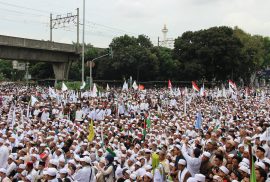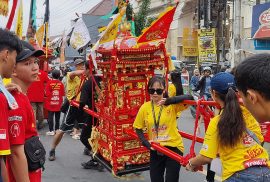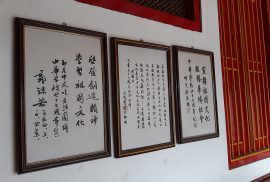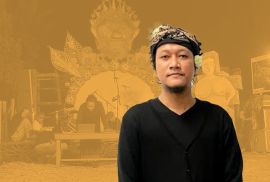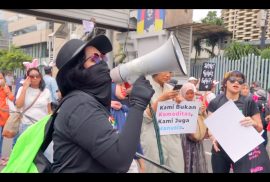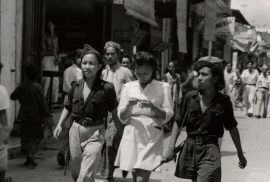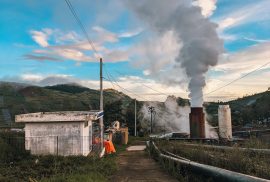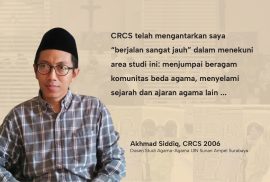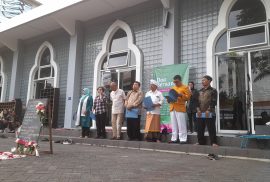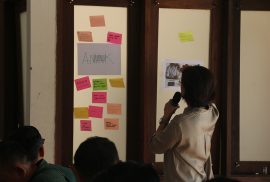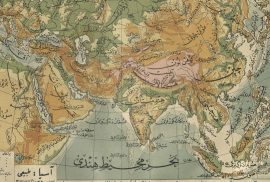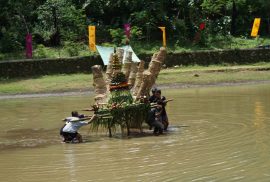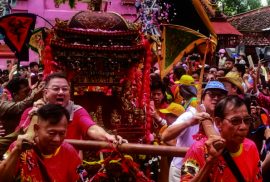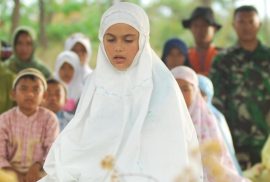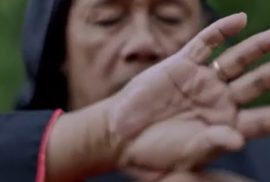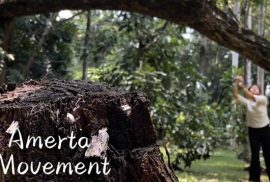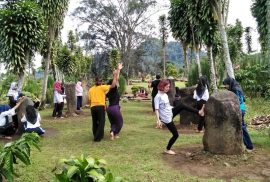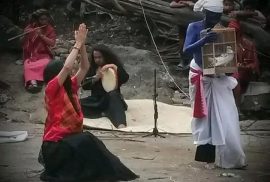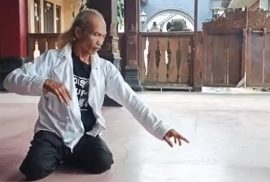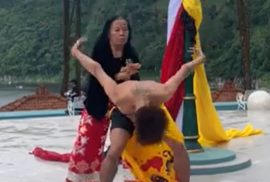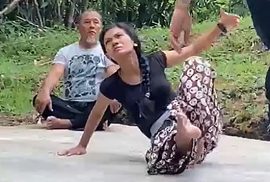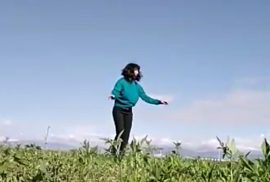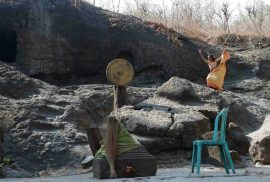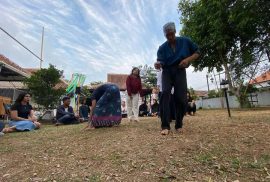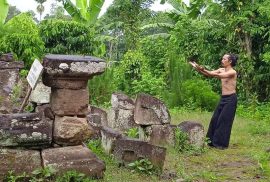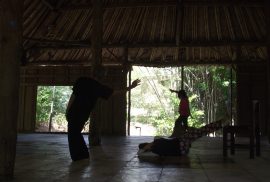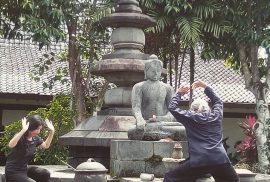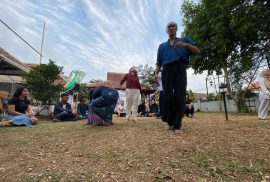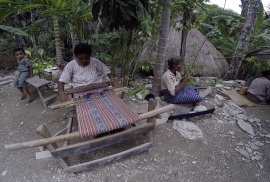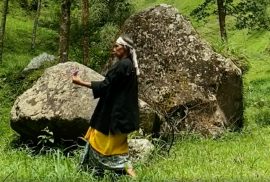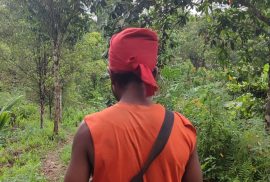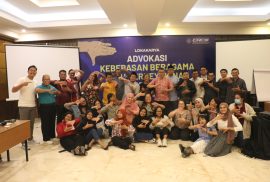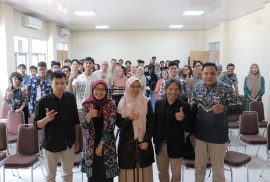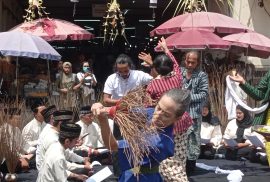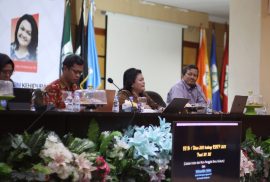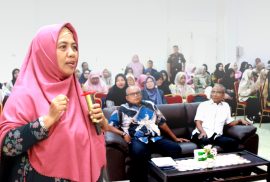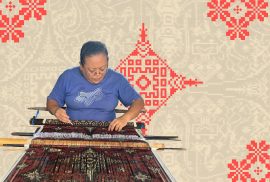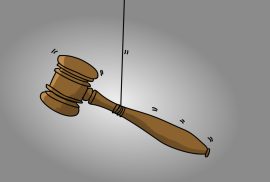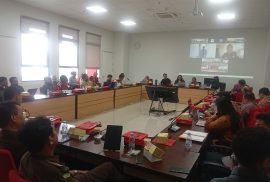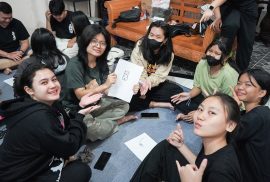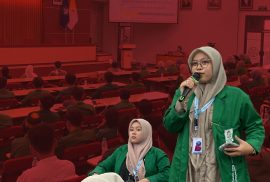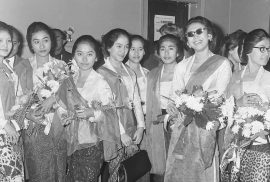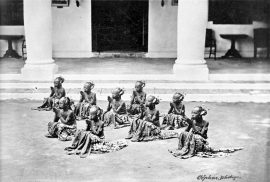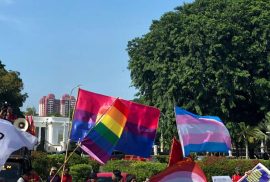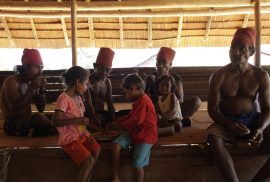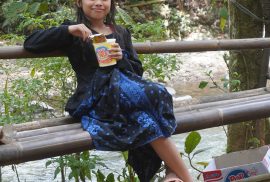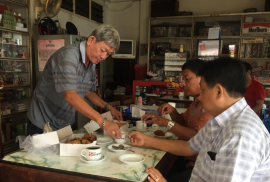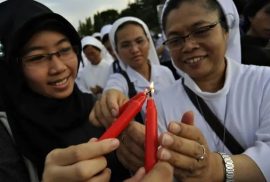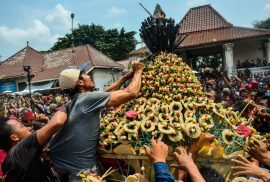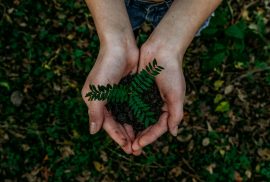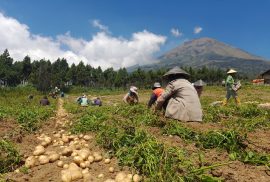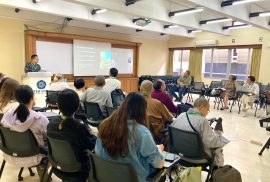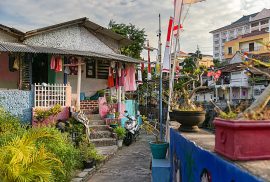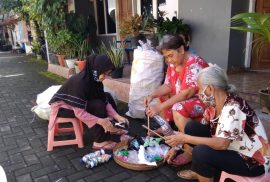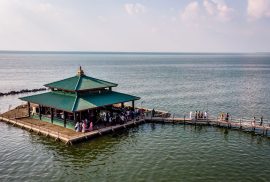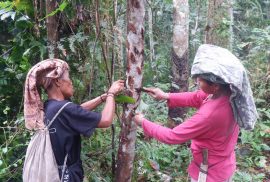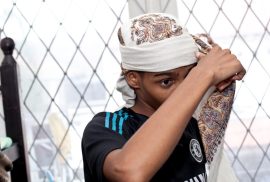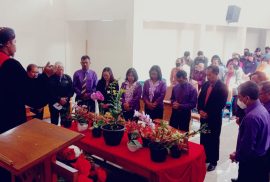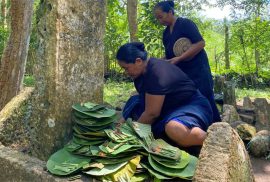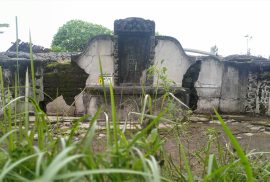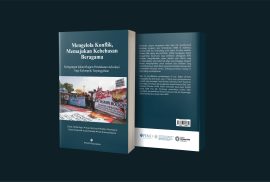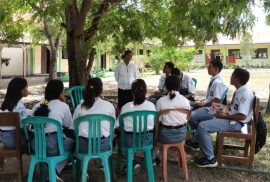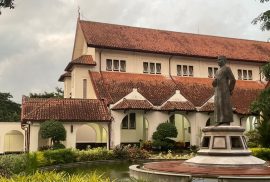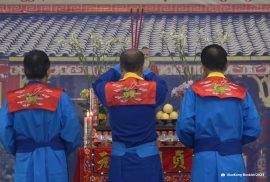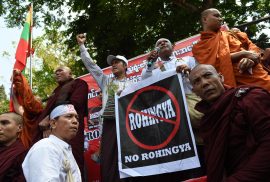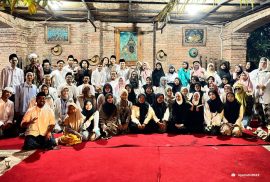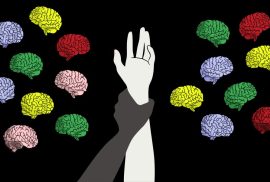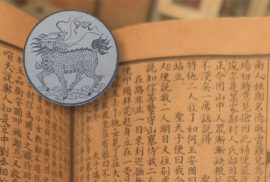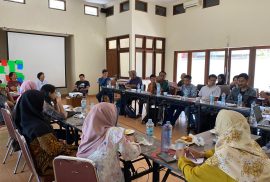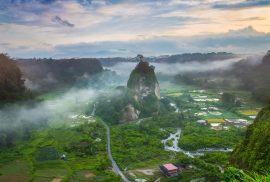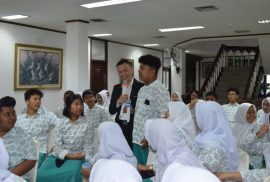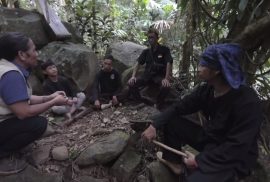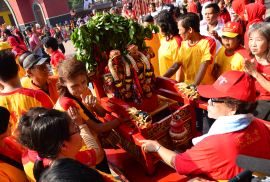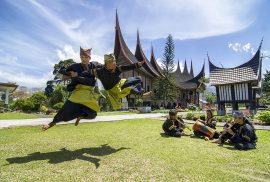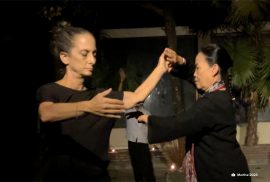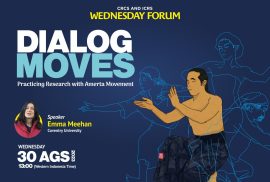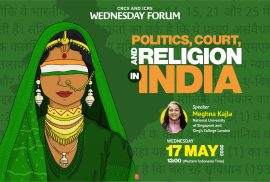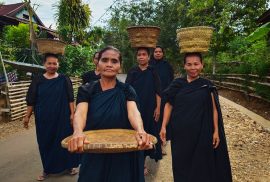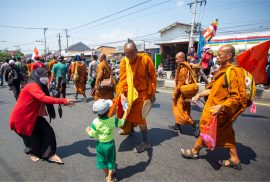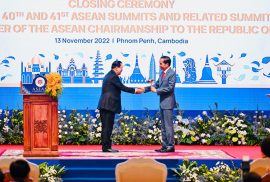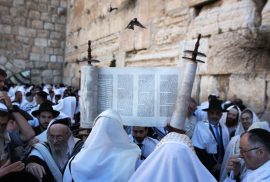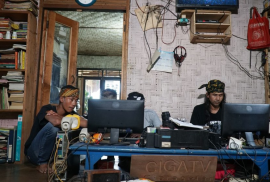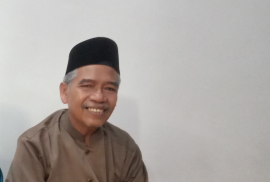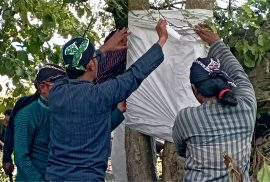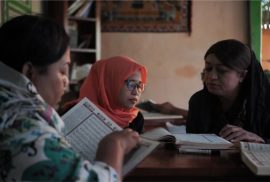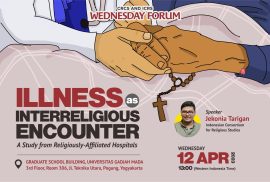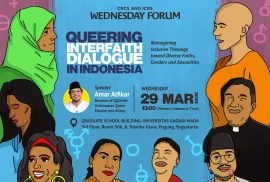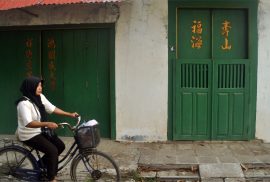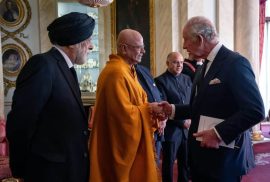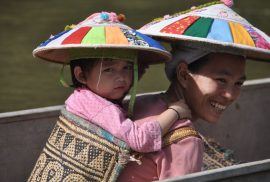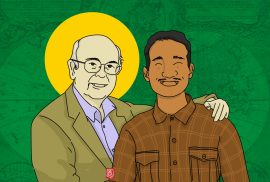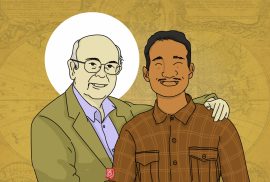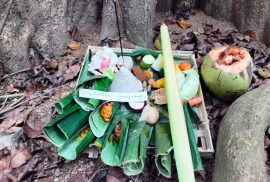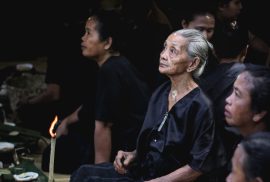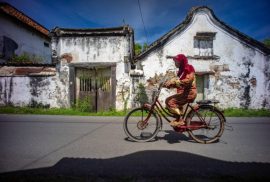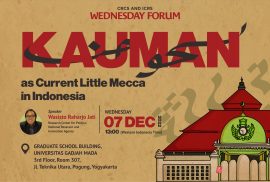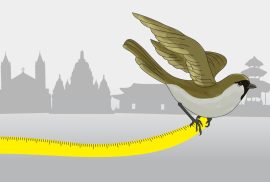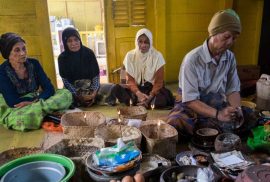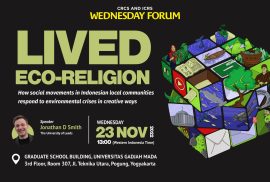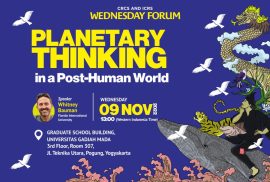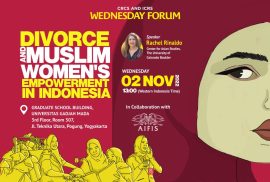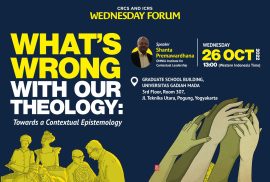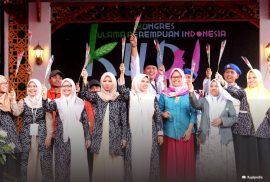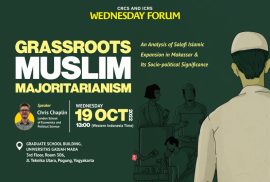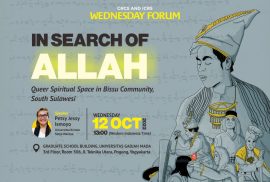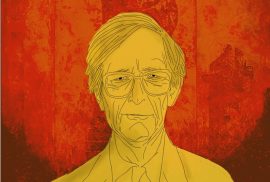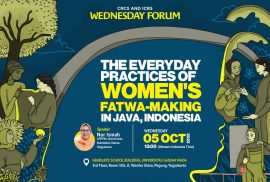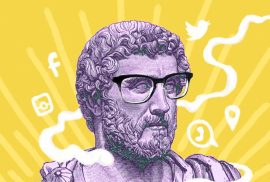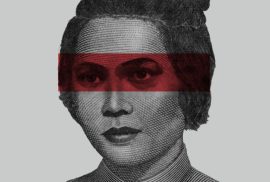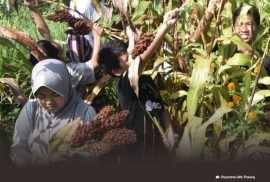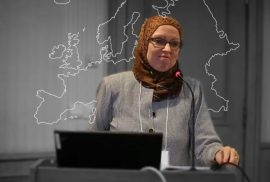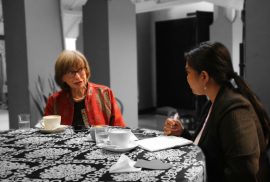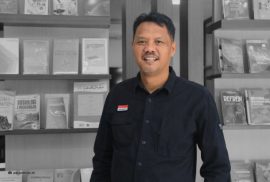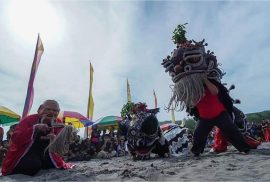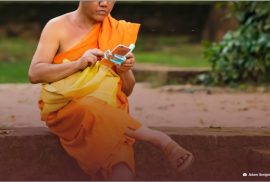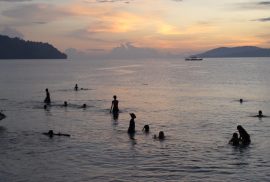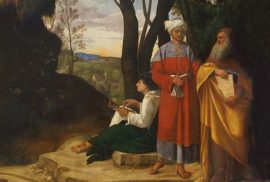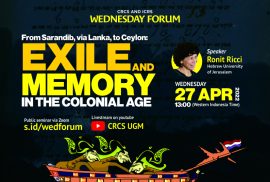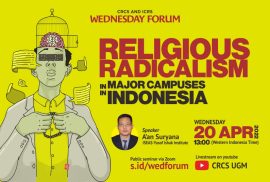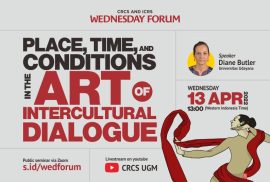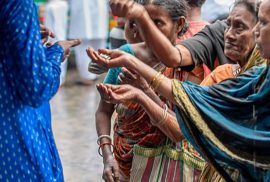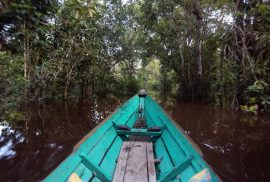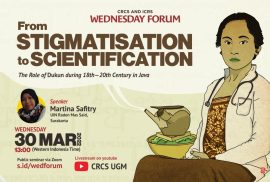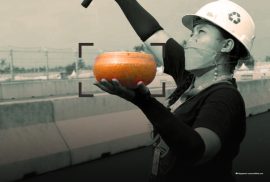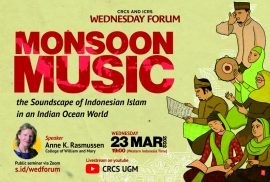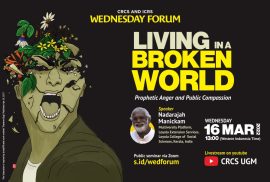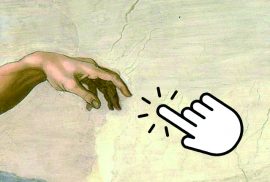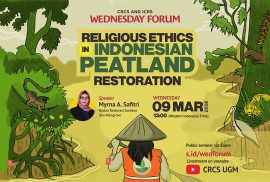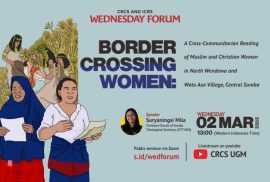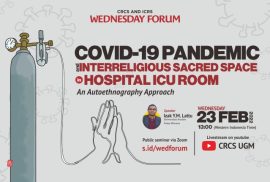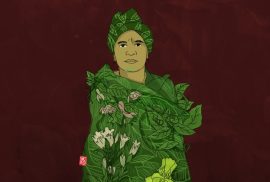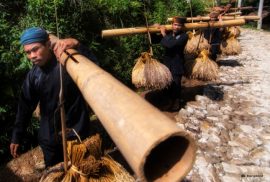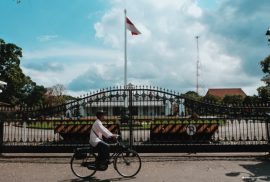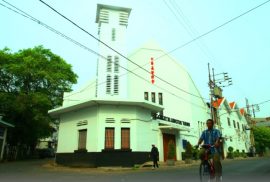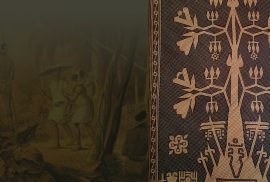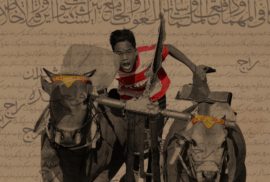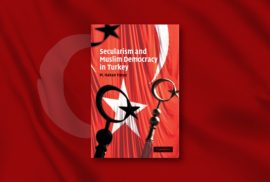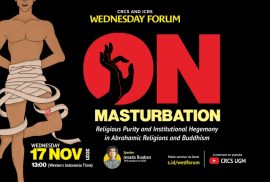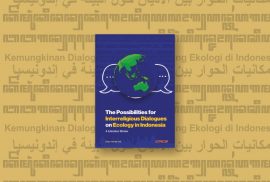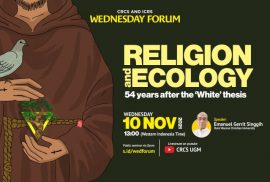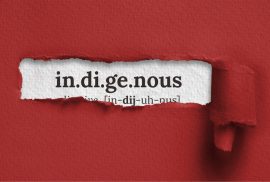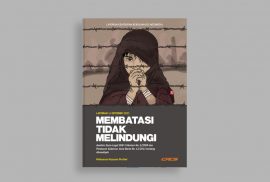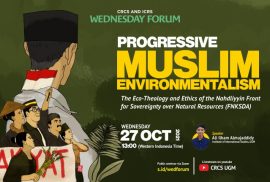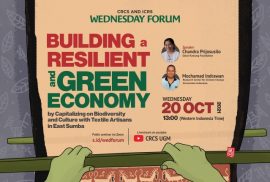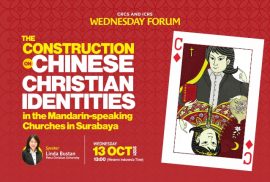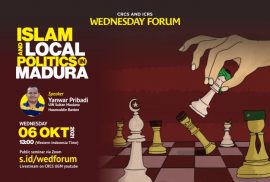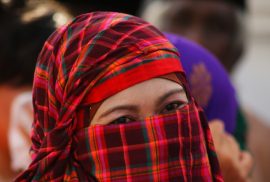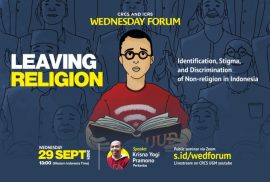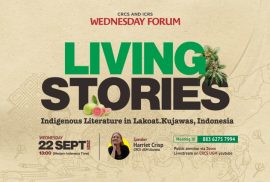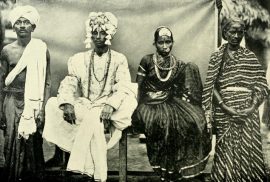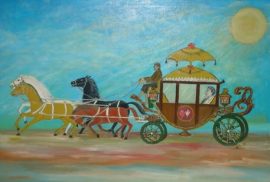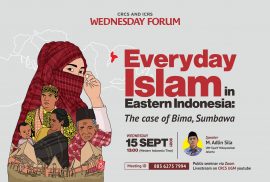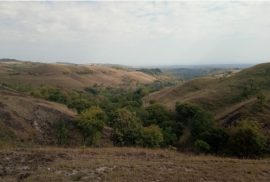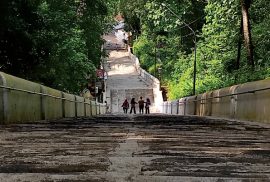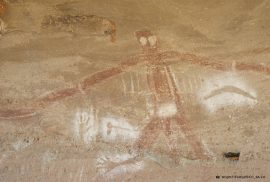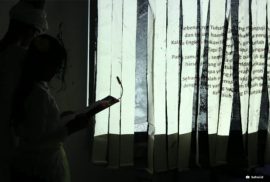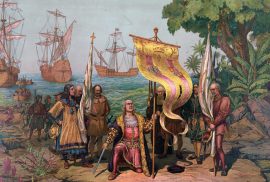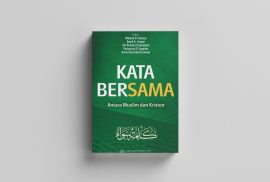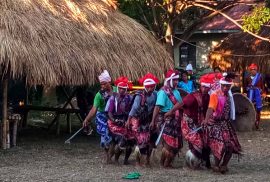Masihkah Islam dan demokrasi kompatibel di Indonesia ketika ormas muslim justru melemah di hadapan pemerintah?
Tradisi bukan hanya tentang peninggalan masa lalu. Di Kelenteng Ban Eng Bio, tradisi menjelma sebagai medium untuk mencipta memori kolektif. Melalui ritual gotong tepekong, aktor-aktor generasi muda kelenteng menegaskan identitasnya.
Jika kolonialisme Eropa dulu datang membawa gold, glory, dan gospel; Indonesia tampaknya meluncurkan spin-off lokalnya: gold, glory, dan gus.
Selama berabad-abad budaya dan masyarakat Tionghoa telah hadir, melebur, dan menjadi bagian tak terpisahkan dari sejarah peradaban Nusantara. Jejak-jejak dinamika tersebut tersimpan dalam berbagai arsip seperti koran, surat, dan buku. Upaya penyelamatan arsip berarti membuka kembali ruang bagi narasi kebangsaan yang lebih inklusif.
Lebih dari seribu salib kayu berwarna merah berdiri di pelbagai titik tanah ulayat suku Awyu di Boven Digoel, Papua Selatan. Salib itu bukan sekadar penanda wilayah ulayat suku Awyu, melainkan juga sebagai bahasa keagamaan dan kultural yang melindungi mereka dari ancaman rencana pembangunan perkebunan sawit.
Di samping mengandung unsur-unsur protektif yang dapat menurunkan gejala depresi, agama juga dekat dengan risiko-risiko tertentu yang berpotensi memperburuk kesehatan mental
Masuknya kekristenan di Asmat tidak hanya membawa pesan keselamatan rohani, tetapi juga membawa sistem makna baru yang berpotensi memutus ingatan spiritual.
Bagaimana bila pemuka agama yang tadinya berperan sebagai penjaga moral justru dianggap sebagai ancaman terhadap moral masyarakat?
Bagi para perempuan Sudan, mungkin ada lebih banyak harapan bagi mereka ketika bertemu langsung dengan Tuhan daripada menderita dan menyerah kepada perbuatan biadab pemerkosa.
Masyarakat Adat Bayan telah lama dikunci oleh label kolonial sebagai “Islam Wetu Telu”. Bahkan istilah ini kerap direduksi menjadi “Islam Waktu Tiga”, yakni anggapan keliru bahwa mereka hanya salat tiga kali sehari.
Pilihan untuk lanjut di CRCS adalah sebuah keputusan besar yang sama sekali, sedetik pun, tidak pernah saya sesali.
Perdebatan tentang sains, agama, dan tradisi merupakan pergulatan yang sangat panjang dalam sejarah peradaban manusia. Upaya merefleksikan dan memosisikan diri menjadi bagian penting dalam memahami makna dan hakikat pengetahuan bagi kehidupan manusia.
Kemunculan kredit pada film bukanlah sebuah akhir, melainkan sebuah ajakan bagi kita, yang ada di seberang layar, untuk menyambung apa yang film itu perjuangkan.
Narasi sejarah sering menghilangkan peran perempuan, kaum trans, dan masyarakat adat. Padahal, mereka berkontribusi besar dalam perjuangan sosial, budaya, dan kemanusiaan.
Industri, korporasi, bahkan lembaga negara berlomba-lomba membingkai diri sebagai bagian dari gerakan hijau. Seolah, dengan menyebut sesuatu yang hijau, seluruh proses di baliknya otomatis menjadi ekologis nan lestari.
Saya menyebut fase akademik saya di CRCS sebagai “kelahiran ketiga”. Mendapatkan pencerahan tentang teori-teori ilmu sosial, studi agama-agama (tidak hanya Islam), dan tentu perjumpaan dengan komunitas agama lain di luar Islam.
Segregasi antara kerja akademik dan aktivisme seringkali digambarkan terpisah oleh garis batas yang saling mengelakkan. Kerja akademik dianggap harus objektif dan netral, sementara aktivisme bersifat subjektif dan politis. Karakteristik yang berlawanan itu membuat anggapan keduanya mesti dipisahkan dalam ruang lingkupnya masing-masing. Anggapan ini coba dikritisi oleh para alumni CRCS UGM berdasar kiprah mereka dalam dunia aktivisme dari berbagai latar belakang.
Program Studi Agama Lintas Budaya, Sekolah Pascasarjana, Universitas Gadjah Mada (UGM) menorehkan prestasi internasional dengan meraih akreditasi dari Foundation for International Business Administration Accreditation (FIBAA) pada level tertinggi: Premium Quality Seal.
Kendati berbeda cara, tiap doa dari masing-masing pemuka agama bertujuan sama: pemulihan bangsa Indonesia dari konflik berkepanjangan serta harapan akan kondisi yang lebih baik lagi. Selama prosesi tersebut, massa aksi duduk tenang seraya mengindahkan tiap untaian doa. Agama dengan caranya sendiri tengah mengadvokasi berbagai isu yang terjadi di masyarakat.
Hak-hak alam membutuhkan kedudukan moral. Bisakah pendekatan KBB membantu?
When faith meets extraction, what or whose priority comes first: communities, organizations, or the environment?
Fellowship KBB 2025 kali ini menghadirkan kelas Klinik dan Advokasi KBB sebagai bagian dari luaran yang tidak hanya menghasilkan gagasan tertulis, tetapi juga aksi nyata.
Melindungi KBB bukan hanya soal agama atau keyakinan, melainkan juga memastikan semua orang, terutama kelompok rentan, dapat hidup dan berkembang tanpa diskriminasi.
Jauh sebelum “religion” diperkenalkan kolonialis Eropa, masyarakat Nusantara telah memiliki pengertian “agama” dengan mengikuti konsep dīn.
Belajar dari berbagai komunitas maupun akademisi perihal istilah dari berbagai masyarakat adat di Indonesia yang berkaitan dengan gender dan seksualitas, hal ini membuat saya penasaran: apakah istilah-istilah tersebut juga dapat berkembang ke skala nasional maupun dikenal secara internasional?
Ekspresi identitas Katolik Tionghoa di Muntilan merupakan bagian integral dari keberagaman pengalaman beragama dan telah melampaui doktrin kaku gereja.
Cara masyarakat Dondong menghidupi tradisi merefleksikan sebuah relasi yang erat antara manusia dan alam. Melalui pengetahuan lokal yang terwariskan secara temurun, semua entitas saling terhubung di dalam telaga dondong, mulai dari tanah, akar, air, manusia, hingga hewan. Masing-masing memiliki peran untuk saling bersinergi.
Makco bukan saja fenomena global yang terabadikan sebagai warisan dunia, melainkan juga merupakan fenomena kosmopolit yang selalu direproduksi dan mewarnai kebudayaan lokal. Kirab Makco telah membuka ruang artikulasi kosmopolitanisme di Indonesia
Hafalan Shalat Delisa menghadirkan persoalan agama dan disabilitas di ruang publik, tetapi masih mengabaikan tantangan realitas penyandang disabilitas.
Greeting (Salam), an Amerta Movement video by Ayu Wardani. I will try to embrace the first time I learned Amerta with Mbah Prapto. I learned how greeting is very important to start a relationship. Greeting the universe, greeting nature, say hi to the universe.
Agama tidak mengekang apa yang seharusnya kita lepaskan. Agama ada sebagai pelipur saat kita harus bersabar dalam berjihad menentang tirani dengan berbagai cara dan kemampuan kita, termasuk, dengan energi marah yang menggerakan kita
Purification, Offering, Surrender; an Amerta Movement Video by Panji Satrio Binangun
Amerta Movement: Spontanity Connecting Awareness by Cyntia Ingrid
by Alexander GB. The movements of Joged Amerta are always intended as a way of greeting others; therefore, movement serves as embodied communication or dialogue. One of the fundamental conditions of dialogue is the recognition and acceptance of the existence of other subjects. In other words, communication can only take place when subjects engage as equals—subject to subject, rather than subject to object.
by Yuliana Meneses Orduño. Amerta Movement creates an impact on the way bodies perceive their spaces, their history, their “natureculture” environment and relationships with other bodies.
Gerak Amerta: Mengolah Rasa, Mengolah Tubuh. Two Amerta Movement videos by Sitras Anjilin
Dear Mulyani, an Amerta Movement Video by Otniel Tasman
Ngolah Doyo by Rifa Fitriana. Each gesture is opportunity to listen, respond, and integrate; blurring boundaries between self and environment
An Amerta Movement Video by Sephia Putri Fatima
A Posthumanist Perspective on Amerta Movement by Yuliana
by Riwanto Tirtosudarmo. I present five poems as my tribute to him. I wrote these five poems in different places and times, whenever I was remembering or thinking about him.
by Martha Hesty Susilowati. Amerta Movement offers a holistic approach that enables women to reclaim their bodies, emotions, and identities from societal constraints. This article explores the synergy between Amerta Movement and women’s empowerment, emphasizing it psychological significance and transformative potential.
by Dody Eskha Aquinas. In its practice, Amerta Movement also fosters self-awareness of natural elements such as earth, fire, wind, water, and metal. Additionally, when combined with prayer or mantra, a spiritual atmosphere emerges that makes humans aware of their connection with the Creator.
by Deny Hermawan. The goal of this movement meditation is to cultivate full awareness of the body, space, and surroundings. Through the process, practitioners learn to listen to their bodies, feel the flow of energy, and connect with nature.
by Bobby Steven Octavianus Timmerman. Joged Amerta and Ragawidya share a common philosophical foundation, both exploring embodiment (kebertubuhan) as a pathway to the Divine.
Mengingat masih kuatnya kontrol negara terhadap kehidupan beragama atau berkeyakinan, pergeseran paradigma dari kerukunan dan moderasi beragama ke kebebasan beragama atau berkeyakinan tampaknya masih perlu menempuh perjalanan jauh dan berliku.
Merti Gunung, an Amerta Movement video by Panji Wibowo
by Theresia Alit. Beyond responding to space and surroundings, a dancer practicing Joget Amerta must also become aware of and liberate the body from all forms of attachment. With its fluid, unstructured movements, Joget Amerta emphasizes the process over the outcome—its value is not measured by the number of spectators. Ultimately, it manifests as living awareness in motion, guiding practitioners to rediscover themselves and cultivate sensitivity.
by Sephia Putri Fatima. Throughout his life, Mbah Prapto worked with students and colleagues from all walks of life, including renowned artists, performers, practitioners, and internationally recognized teachers—whom he simply regarded as "friends." He encouraged these "friends" to share and spread their understanding of his work.
Sebagai bagian dari hak asasi manusia (HAM), kebebasan beragama atau berkeyakinan (KBB) selalu terhubung dengan hak-hak yang lain. Oleh karena itu, pelanggaran terhadap KBB seringkali berdampak pada pelanggaran hak-hak yang lain.
Anyaloka, an Amerta Movement Video by Silvia Dewi Marthaningrum
mandala-Mandala, an Amerta Movement video by Agus Bimo Prayitno. Learning and practicing awareness of one's presence (jagad cilik) among others and within the jagad gedhe is to create a magnificent, exotic, and harmonious orchestration of life.
Batin Lahir, An Amerta Movement video by Susana Miranti Kroeber and Yasudah S.
Pujamantra, an Amerta Movement video by M. Panji Wibowo
Alih-alih sebuah pengetahuan takhayul tak berdasar, Maquwoli adalah sebuah gagasan dan praktek hidup yang sangat kontekstual secara sosial-ekologis, yang berakar dari analisis empirik yang mendalam
Selama ini KUHP 2023 yang akan efektif berlaku tahun depan ini jarang dibicarakan di akar rumput. Padahal, masyarakat awamlah—terutama dari kelompok rentan keagamaan—yang akan terpengaruh secara signifikan.
Karakter dari KUHP itu adalah membatasi hak. Yang menjadi perhatian ialah bagaimana pembatasan itu tidak melanggar hak warganegara, terutama dalam hal beragama atau berkeyakinan.
oleh Alexander GB. Joged Amerta melatih kita semua untuk mengenali dan mengalami perubahan diri kita yang unik, sebagai bagian dari suatu konteks, untuk merasakan diri pada saat tertentu dan sekaligus sebagai makhluk yang berada dalam ekologi yang lebih luas, menumbuhkan rasa bersama antara yang mikro dan yang makro.
oleh Yuliana Meneses Orduño. Joged Amerta berdampak pada cara tubuh mempersepsikan ruang, sejarah, lingkungan “nature-culture”, serta relasinya dengan tubuh-tubuh lainnya.
oleh Diane Butler. Esai singkat ini berangkat dari ide bahwa salah satu proses Prapto sejak awal 1970-an adalah untuk berdiskusi tentang konsep-konsep gerak, mengupas ide-ide, dan kemudian mencoba "under stand" melalui pengalaman latihan gerak.
oleh Riwanto Tirtosudarmo. Saya mempersembahkan lima puisi sebagai penghormatan saya kepada Pak Prapto. Kelima puisi ini saya tulis di tempat dan waktu yang berbeda, setiap kali saya mengenang atau memikirkannya.
oleh Martha Hesty Susilowati. Joged Amerta menawarkan pendekatan holistik yang memungkinkan perempuan untuk merebut kembali tubuh, emosi, dan identitas mereka dari batasan-batasan sosial. Artikel ini mengeksplorasi sinergi antara Gerakan Amerta dan pemberdayaan perempuan, dengan menekankan signifikansi psikologis dan potensi transformatifnya.
oleh Sephia Putri Fatima. Sepanjang hidup, Mbah Prapto mendorong "sahabat-sahabat"-nya untuk berbagi dan menyebarkan pemahaman mereka tentang karyanya.
oleh Theresia Alit. Dengan gerakannya yang luwes dan tidak terstruktur, Joget Amerta lebih menekankan proses daripada hasil—nilainya tidak diukur dari jumlah penonton. Pada akhirnya, ia terwujud sebagai kesadaran yang hidup dalam gerakan, membimbing para praktisi untuk menemukan kembali diri mereka dan menumbuhkan kepekaan.
by Diane Butler. This brief essay stems from the idea that one of Prapto’s processes since the early-1970s was to discuss about his movement concepts, to peel ideas, and then try to ‘under stand’ via the experience of movement practice. Not for grasping onto an identity or category of work; rather for ‘re-cognizing’ that one’s understanding and awareness of movement arts and life will always be changing according to the environment and journey of time.
oleh Deny Hermawan. Tujuan dari meditasi gerak ini adalah untuk menumbuhkan kesadaran penuh terhadap tubuh, ruang, dan lingkungan sekitar. Melalui proses ini, praktisi belajar mendengarkan tubuh mereka, merasakan aliran energi, dan terhubung dengan alam.
oleh Dody Eskha Aquinas. Dalam praktiknya, Amerta Movement juga menumbuhkan kesadaran diri terhadap unsur-unsur alam seperti tanah, api, angin, air, dan logam. Selain itu, bila dipadukan dengan doa atau mantra, muncullah suasana spiritual yang menyadarkan manusia akan keterhubungannya dengan Sang Pencipta.
oleh Bobby Steven Octavianus Timmerman. Joget Amerta dan Ragawidya memiliki landasan filosofis yang sama, keduanya mengeksplorasi perwujudan (kebertubuhan) sebagai jalan menuju Yang Ilahi.
Sebuah diksi bukan hanya menjadi cerminan identitas pribadi maupun kelompok, melainkan juga menggemakan sikap eksklusivitas atau inklusivitas. Ketika digunakan dalam arena kontestasi politik, sosial maupun agama, bahasa dapat menjelma menjadi alat untuk menyatakan sekaligus menyingkirkan identitas tertentu.
Meski diwanti-wanti sebagai kemajuan setengah jalan, KUHP 2023 menjanjikan terbuka luasnya ruang tafsir untuk melindungi hak beragama dan berkeyakinan.
Keberadaan delik terkait agama atau kepercayaan dalam Kitab Undang-Undang Hukum Pidana (KUHP) 2023 membawa angin segar bagi kebebasan beragama atau berkeyakinan (KBB) di Indonesia. Namun, hukum pidana tak selalu menjadi solusi atas kasus intoleransi dan diskriminasi yang terjadi.
Sebagai daerah khusus yang memiliki hukum tersendiri, integrasi KUHP 2023 dan qanun diperlukan untuk menjaga kebebasan beragama atau berkeyakinan (KBB) di Aceh.
Kain tenun bukan sekadar selembar sandangan. Setiap lembarnya mewakili relasi simbolik antara makna dan kesimbangan nilai kehidupan pembuatnya.
Di mata pihak-pihak intoleran, teks-teks hukum “yang tidak jelas” dapat diterjemahkan secara intoleran juga.
Pemerintah dengan percaya diri menyatakan bahwa Kitab Undang-Undang Hukum Pidana (KUHP) baru yang disahkan 2023 silam memberikan jaminan kehidupan beragama atau berkeyakinan (KBB) yang lebih baik. Pasal 300–305 KUHP 2023 yang bertajuk Tindak Pidana terhadap Agama, Kepercayaan, dan Kehidupan Beragama atau Kepercayaan secara khusus mengatur delik keagamaan. Namun, pasal-pasal tersebut rupanya berpotensi kuat menjadi “pasal karet” yang rentan untuk ditafsirkan menurut kepentingan pihak-pihak intoleran. Jika demikian, perlindungan terhadap masyarakat yang berasal dari kelompok-kelompok rentan keagamaan akan makin terciderai.
Ketidakjelasan hukum dapat berakibat pada penegakan hukum yang diskriminatif. Ketidakjelasan ini kerap bermuara pada ketidakjelasan rumusan hukum itu sendiri. Akibatnya, hukum yang harusnya menjadi pelindung, malah jadi perundung.
Dalam KUHP 2023, bab agama atau kepercayaan mendapat ruang tersendiri melalui pasal 300—305. Penafsiran yang tepat terhadap isi pasal-pasal tersebut menjadi langkah vital agar implementasinya relevan dengan realitas sosial masyarakat dan pemajuan hak asasi manusia.
Kendati bukan negara agama, Indonesia menempatkan agama sebagai salah satu pilar penting dalam kehidupan sosial dan bernegara. Dengan kata lain, keberadaan agama perlu dilindungi oleh negara. Namun, sebelum 2023, KUHP yang dipunyai Indonesia merupakan warisan negara sekuler Belanda sehingga agama tidak mendapatkan tempat dalam undang-undang tersebut. Karenanya, sejak Seminar Hukum Nasional I 1963 ada keinginan kuat untuk memiliki “delik agama” dalam suatu KUHP Nasional.
Betapa pun berbeda pengalaman dan pandangan religius dengan generasi pendahulunya, anak muda Khonghucu tak akan pernah tercerabut dari “tulang” leluhurnya.
Belajar Pengelolaan Pengetahuan dalam Studi Agama Lintas Disiplin
20 Januari 2025
Bagaimana jurusan ilmu hadis, filsafat, dan jurusan-jurusan politik bisa masuk ke studi agama lintas disiplin?
Pertanyaan itu terlontar dari salah satu peserta kunjungan akademik Fakultas Ushuluddin dan Filsafat Universitas Islam Negeri (UIN) Alauddin Makassar ke CRCS UGM (Program Studi Agama Lintas Budaya [ALB], Sekolah Pascasarjana UGM), pada 20 Januari 2025. Kunjungan yang diikuti oleh 68 mahasiswa ini dipimpin oleh Prof. Dr. H. Muh. Natsir Siola, Guru Besar Filsafat Ilmu UIN Alauddin, dan Dr. Muhammad Ali, Ketua Program Studi Aqidah dan Filsafat Islam. “Lintas disiplin merupakan sebuah keniscayaan dalam studi agama, ” jelas Samsul Maarif, Ketua Program Studi ALB. “Sebagai sebuah isu, agama tidak pernah berdiri sendiri. Untuk memahaminya, butuh kajian dari berbagai disiplin,” lanjut dosen yang akrab dipanggil Anchu ini. Secara praktik, pengelolaan pengetahuan lintas disiplin di CRCS tecermin dalam kurikulum yang bermuara pada tiga klaster penelitian studi agama: Agama, Budaya, dan Alam; Relasi Antaragama; Agama dan Pendidikan Publik. Karakter lintas disiplin ini pula yang menjadi titik tolak CRCS dalam pengejawantahan tri dharma perguruan tinggi. Setiap penelitian yang ada di CRCS selalu dikaitkan dan dikembangkan dalam pengajaran maupun pendidikan publik.
Meskipun Indonesia telah merdeka secara fisik, konstruksi cisgender ala kolonial masih berkembang hingga saat ini. Ajaran keagamaan yang kian patriarkis turut merawatnya sampai kini.
Semasa kolonial, pemerintah Hindia Belanda menerapkan politik agama dengan menjadikan ajaran di luar Kristen, Katolik, dan Islam sebagai geen goddienst atau nonagama (Yulianti, 2022). Politik agama tidak hanya memaksa masyarakat adat untuk mengikuti ajaran agama-agama yang diakui pemerintah, tetapi juga konstruksi gender yang dibawanya. Contohnya bisa kita lihat pada kasus komunitas bissu. Pemerintah kolonial menjadikan tradisi dan identitas seksual komunitas bissu sebagai “amoral”. Alhasil, komunitas tersebut menjadi objek utama konversi agama (Gouda, 1995).
Menelusuri Kembali Jejak Marginalisasi Gender di Indonesia
Afkar Aristoteles Mukhaer – 07 Januari 2025
Perempuan dan lelaki memang memiliki tubuh biologis yang berbeda. Namun, perbedaan ini tidak serta-merta secara alamiah menggariskan peran dan ekspresi gendernya di kebudayaan masyarakat tertentu.
Banyak ahli sejarah dan antropolog berpendapat bahwa kebudayaan patriarki bermula sejak manusia masih dalam peradaban berburu dan meramu. Salah satu yang menonjol ialah antropolog Richard B. Lee dan Irven DeVore. Keduanya menginisiasi simposium internasional terkait fase peradaban manusia tersebut dan menghasilkan kumpulan esai berjudul Man the Hunter (1968). Di antara simpulannya, masyarakat peradaban berburu dan meramu menentukan peran gender berdasarkan fitur biologis laki-laki dan perempuan. Perempuan, pemilik rahim dan payudara, berperan menjaga keberlangsungan populasi komunitas dan mengurusi domestik. Sementara laki-laki, dengan fisik yang lebih sederhana dan berpenis, menjadi penyedia keberlangsungan komunitas.
Agama: Solusi atau Sumber Masalah Kesehatan Mental?
Anisa Eka Putri Kusmayani – 13 Desember 2024
Emang ya agama bisa jadi salah satu alasan orang jadi sehat mental, tapi ga jadi satu-satunya faktor orang itu yang sehat mental (Zuri, konselor Into the Light)
Banyak riset menyatakan bahwa semakin tinggi tingkat religiusitas, semakin rendah tingkat depresi (Heo dan Koeske, 2009; Koenig, McCullough, dan Larson, 2001; George, 2002). Hal ini sejalan dengan temuan ilmuwan lain (Campante dan Yanagizawa-Drott, 2013; Elliot dan Hayward, 2009) yang menunjukkan kaitan antara religiusitas dan kompetensi dalam mekanisme koping ketika dalam situasi sulit, termasuk saat menderita penyakit yang tidak dapat ada obatnya (terminal illness). Namun, agama tak selalu menjadi pendorong sehat mental, malah kerap menjadi penyebab gejala masalah mental (Pargament dan Lomax, 2013).
Transpuan dan Hak Demokrasi yang Terabaikan
Nita Amriani – 11 November 2024
Apakah seorang transpuan lahir hanya untuk mengecap pedihnya bayang-bayang persekusi dan menjadi pelengkap suara pemilu?
Diskriminasi dan stigma berlapis menyingkirkan kelompok transpuan dari hak-hak dasar sebagai warga negara. Banyak transpuan sulit mengakses pekerjaan dan hidup dalam ancaman persekusi. Di sisi lain, mereka juga tak lagi punya ruang aman di rumah karena keluarga mereka tidak lagi mau menerimanya. Bagi kelompok transpuan, konsep keadilan dalam sila ke-5 Pancasila masih jauh api dari panggang.
Suara Masyarakat Adat di Tengah Bayang-Bayang Demokrasi
Vikry Reinaldo Paais – 06 November 2024
Pembangunan nasional yang diklaim oleh pejabat pemerintahan sebagai sarana untuk meningkatkan kesejahteraan sosial justru merampas, mengkriminalisasi, serta mengeksklusi hak-hak hidup masyarakat adat dan penganut agama leluhur. Hutan dan tanah mereka dirampas oleh negara untuk dijadikan kawasan produksi maupun konservasi. Ketika masyarakat adat berjuang mempertahankan hak atas tanahnya, mereka justru dikriminalisasi oleh aparat negara. Dalam konteks sosio-religius, sebagian besar masyarakat maupun pemimpin agama menstigma masyarakat adat sebagai belum beradab, masih primitif, serta belum beragama sehingga harus dimodernkan dan diagamakan. Problematika ini adalah tantangan serius dalam konteks Indonesia yang mengumandangkan demokrasi sebagai sistem pemerintahan dan prinsip hidup berbangsa dan bernegara. Isu-isu krusial ini menjadi bahasan utama dalam perhelatan International Conference and Consolidation on Indigenous Religion (ICIR) ke-6 pada 22-25 Oktober 2024 di Ambon.
Kumpulan tulisan berkaitan dengan ajaran, filsafat, etika, dan sudut pandang tentang Agama Khonghucu
Terjemahan dari buku Mandarin yang berisi tentang upaya dalam meningkatkan kesadaran dan pengembangan pengertian yang benar terhadap penghayatan Dharma serta hal hal yang berhubungan dengan astrologi China dalam kehidupan.
Kumpulan ramalan yang dikaitkan dengan Prabu Jayabaya, raja Kerajaan Kediri, yang berisi prediksi tentang masa depan Nusantara, khususnya Pulau Jawa, dan sering dihubungkan dengan peristiwa-peristiwa penting dalam sejarah Indonesia
Terjemahan dari kitab Tjung Yung yang tergolong salah satu kitab Sze Su. Berisi tentang pelajaran dan petunjuk dari Nabi Agung Khonghucu
Kisah Mahabharata jilid I
Kisah Mahabharata jilid II
Pemahaman terkait Agama Khonghucu dan Pancasila beserta hubungan di antara keduanya
Transformasi Modernitas yang Berlantas di Kanekes
Afkar Aristoteles Mukhaer – 15 Oktober 2024
Modernitas membawa tantangan bagi masyarakat Urang Kanekes. Namun, mereka punya cara tersendiri dalam menghadapinya.
Masyarakat adat Urang Kanekes—atau yang lebih populer dengan nama Baduy—di Banten selalu menarik perhatian para peneliti. Setidaknya ada 95 dokumen karya ilmiah yang memuat kata kunci “Baduy” dan 23 dokumen karya ilmiah dengan kata kunci “Kanekes” di situs Scopus. Ketertarikan ini muncul, di antaranya, karena masyarakat adat Kanekes sangat melestarikan ajaran tradisi leluhur sampai hari ini kendati wilayah adat mereka tidak jauh dari Jakarta, kota metropolitan serba modern.
Kedai kopi yang dianggap sekadar tempat transaksi ekonomi, ternyata menjadi ruang penting terciptanya sebuah dinamika relasi lintas etnis dan agama yang sarat akan luka masa lalu.
Keberagaman di Tengah Keberagamaan
Yohanes Leonardus Krismawan Anugrah Putra – 30 September 2024
“…because we believe the Indonesian voices need to be projected and amplified not just in Indonesia, but beyond as well”
Demikian sepenggal sambutan Brett G. Scharfis, Direktur International Center for Law and Religion Studies (ICRLS) dari Univeritas Brigham Young, dalam study visit bertajuk “Promoting Freedom of Religion or Belief in Indonesia: Challenges and Opportunities” di auditorium Pascasarjana UGM. Kunjungan belajar ini bukan sekadar visitasi institusional, melainkan juga ruang untuk membicarakan berbagai peluang maupun tantangan dalam membangun kebebasan beragama atau berkeyakinan (KBB) di Indonesia.
Ambiguitas dan Toleransi dalam Tradisi Masyarakat Muslim
Afkar Aristoteles Mukhaer – 25 September 2024
Sepanjang sejarah peradaban Islam, perdebatan tafsir selalu hadir dengan saling menghargai perbedaan pendapat.
Realitas pemahaman dan praktik ajaran Islam sebagai aturan universal masih ambigu. Meski tuntunannya termaktub dalam pegangan dasar—Al-Qur’an dan hadis—interpretasinya selalu terbuka untuk dibahas dari perspektif dan ideologi tertentu. Cendekiawan dan ulama kerap berbeda paham atas interpretasi ajaran Islam sehingga mendorong terbentuknya ragam tafsir dan tarekat dalam Islam.
Ketika organisasi keagamaan menerima pengelolaan tambang, masih ada harapan kepedulian lingkungan yang terus bertumbuh
Dari Nurani Jadi Aksi
Afkar Aristoteles Mukhaer – 15 September 2024
Sebagian umat beragama menyadari gejala alam yang tidak menentu sebagai fenomena perubahan iklim. Lantas, sejauh mana pengetahuan agama mendorong umatnya melakukan kegiatan yang mendukung lingkungan?
“Agama memiliki efek ganda dalam membentuk perilaku ramah lingkungan,” jelas Iin Halimatusa’diyah, Direktur Riset Pusat Pengkajian Islam dan Masyarakat (PPIM) UIN Jakarta, lewat presentasinya bertajuk “From Belief to Action: Religious Values and Pro-Environmental Behavior in Indonesia” dalam Wednesday Forum (4/9).
Tanda-tanda kerusakan lingkungan ini sudah mulai terlihat. Erosi semakin sering terjadi, hasil panen menurun, dan banyak petani mulai bangkrut. Dalam situasi genting ini, alih-alih mengambil langkah konservasi lahan pertanian, para petani kentang terus memacu produksi kentang seolah tidak terjadi apa-apa. Masjid-masjid besar yang menjadi simbol kesejahteraan terus bermunculan, aktivitas keagamaan pun kian inten
berdasarkan data dari Institute for Policy Analysis of Conflict (IPAC), Bima merupakan daerah dengan rekam jejak aktivitas terorisme yang tinggi. Lantas, karakteristik keagamaan seperti apa yang tengah berkembang di antara masyarakat Bima? Sejauh mana karakteristik keagamaan itu mempengaruhi perkembangan terorisme di Bima?
Meneroka Diplomasi Buddhis dalam Sejarah Asia Modern
Yulianti – 20 Agustus 2024
Dalam sejarah kolonialisme di Asia modern, jejaring dan aliansi tidak hanya terjadi melalui jaringan negara kolonial, tetapi juga aliansi kelompok masyarakat yang ada di dalamnya. Salah satu bentuk aliansi yang berperan penting dalam geopolitik tersebut ialah diplomasi buddhis.
Dinamika tersebut menjadi bahasan utama dalam panel “Friends in Dharma: Buddhist Diplomacy and Transregional Connection in Modern Asia”. Panel ini merupakan bagian dari kluster tema Inter Area/Border Crossing pada “AAS in ASIA Conference”di Universitas Gadjah Mada, Yogyakarta, Indonesia pada 9–11 Juli 2024. Mengambil latar belakang sejarah Asia modern, panel Buddhist Diplomacy ini memfokuskan kajian pada kiprah komunitas agama yang berasal dari kalangan yang berbeda-beda dalam membentuk jaringan, aliansi, dan kerja sama di Asia pada pertengahan abad ke-20 sampai ke-21. Jaringan dan hubungan-hubungan kelompok inilah yang kemudian dimaknai sebagai buddhist diplomacy (diplomasi buddhis) yang melibatkan individu, kelompok, dan negara-negara buddhis di Asia. Keberadaan diplomasi buddhis ini mempengaruhi hubungan transregional dan pertukaran budaya dari abad ke-20 hingga abad ke-21 di Asia.
Sajadah Panjang Itu Bermula dari Sampah
Haikal Fadhil Anam – 20 Juli 2024
Mengelola sampah di kawasan sungai memang bukan pekerjaan ringan, apalagi jika sungai tersebut berada tepat di jantung kota seperti Kali Code, Yogyakarta. Pada tahun 1980-an, Kali Code terkenal sebagai kawasan kumuh dengan kondisi sungai penuh sampah dan kotoran manusia. Kala itu, bantaran Kali Code menjadi tempat tinggal gelandangan, pemulung, pekerja seks komersial, dan masyarakat luar Jogja yang tidak memiliki rumah. Mereka menghuni sekitar daerah aliran sungai atau di sela-sela lahan kuburan Tionghoa yang berada tak jauh dari sungai. Sempat hendak digusur oleh pemerintah untuk kawasan hijau, kondisi dan wajah Code mulai berubah ketika Romo Mangunwijaya menginisiasi penataan Kampung Code Utara. Kampung kelam di tengah kota tersebut perlahan menjadi model percontohan permukiman kota yang hidup selaras dengan lingkungan. Upayanya itu kemudian diganjar dengan Penghargaan Aga Khan untuk Arsitektur pada 1992.
Hijrah Minim Sampah:
Sebuah Ekolinguistik Islam ala Ibu Rumah Tangga
Nanda Tsani – 29 Juli 2024
Isu lingkungan tidak melulu berkutat pada hal-hal gigantis seperti krisis iklim, efek rumah kaca, kenaikan suhu bumi, mencairnya es Antartika, atau kepunahan massal. Bagi June Cahyaningtyas, isu lingkungan ialah juga tentang hal-hal keseharian yang tampak di pelupuk mata dan jangkauan tangan: wastafel mengilap yang kembali dipenuhi piring kotor, ember kosong yang penuh pakaian apek, hingga timbunan sisa makanan di tempat sampah dapur. Berangkat dari minat keamanan nontradisional dalam kajian Hubungan Internasional (HI), dosen HI Universitas Pembangunan Nasional “Veteran” ini meneroka dimensi keagamaan dalam praktik lingkungan berkelanjutan melalui pengalaman perempuan urban di Jawa. Hasil kajiannya itu ia presentasikan dalam Wednesday Forum, 15 Mei 2024, bertajuk “Sustainable Living Practice Among Urban Women in Java”.
Beradaptasi lewat Agama di Tengah Abrasi Pantai Utara Jawa
Rezza Prasetyo Setiawan – 20 Juli 2024
Salah satu dampak nyata krisis iklim ialah kenaikan air laut dan abrasi yang menenggelamkan daerah-daerah di kawasan garis pantai. Sebagai negara dengan garis pantai terpanjang di dunia, Indonesia menjadi salah satu wilayah yang paling terdampak. Lantas, bagaimana masyarakat Indonesia yang tinggal di kawasan terdampak beradaptasi dengan hal ini? Sejauh mana pemahaman dan praktik keagamaan mereka berperan dalam proses adaptasi tersebut?
Pertanyaan itu menjadi salah satu titik tolak disertasi Aliyuna Prastiti yang ia presentasikan dalam Wednesday Forum bertajuk “Making Sense of Religion in Adaptation Processes”, 8 Mei 2024. Dosen program studi Hubungan Internasional, Universitas Padjadjaran, ini meneliti dua komunitas masyarakat yang tinggal pesisir utara Pulau Jawa, yaitu Bedono, Kabupaten Demak, Jawa Tengah dan Pantai Bahagia, Bekasi, Jawa Barat.
Dinamika Keagamaan Talang Mamak: Sebuah Catatan Lapangan
Miftha Khalil Muflih – 10 Juni 2024
“Kau siapo, kok baru tetengok di siko?”
Pertanyaan itu meluncur dari salah seorang penjual di salah satu pasar yang ada di Kabupaten Tebo, Provinsi Jambi. Melihat ada orang yang tampak asing, sang penjual sedang bertanya siapa gerangan saya. Dengan penduduk yang terhitung sedikit, masyarakat memang akan mudah untuk menandai orang asing yang datang ke lingkungan tersebut. Merespon pertanyaan tersebut, saya mengenalkan diri sebagai mahasiswa Jogja yang sedang magang dan riset di masyarakat adat Talang Mamak. “Oh Talang Mamak yo, mereka di sano animisme kan, yang menyembah sungai, pohon,” tukasnya. Salah seorang masyarakat Talang Mamak yang membersamai saya lalu menyahut, “Awak la punyo agama, Kristen agama awak”. Ia merespons sambil tersenyum kecut.
Mempertahankan Agama Seadanya–Sebisanya di Negara Transit
Nanda Tsani – 16 Mei 2024
Pernahkah Anda transit di suatu bandara luar negeri? Transit selama 2 atau 3 jam mungkin tidak begitu terasa sembari menikmati fasilitas yang ada, tetapi bagaimana jika harus transit hingga puluhan jam? Betapapun berbagai aktivitas membunuh waktu dilakukan, tetap saja jemu itu datang, bukan? Sementara, para pengungsi dan pencari suaka di Indonesia rerata menjalani waktu transit antara 5 sampai 10 tahun penuh kegetiran.
Berangkat dari situasi yang dialami para pencari suaka ini, Realisa D. Massardi, Dosen Antropologi UGM, melakukan penelitian etnografi guna memahami manuver dan dinamika para remaja pengungsi dan pencari suaka dalam menavigasikan identitas keagamaan mereka di tanah transit. Selama kurang lebih 14 bulan dalam kurun 2016–2017, Dosen Antropologi UGM ini melakukan penelitian di empat lokasi pengungsian. Realisa memaparkan hasil penelitiannya dalam Wednesday Forum edisi 24 April 2024 bertajuk “Religion in Transit: Young Refugees Navigating Religious Sphere in Indonesia”.
Memperluas Makna Pentakosta Melalui Unduh-Unduh
Rezza Prasetyo Setiawan, Eikel Karunia Ginting – 14 Mei 2024
Ada banyak cara umat kristiani di Indonesia merayakan Pentakosta, hari ke-50 masa Paskah yang menjadi momen turunnya Roh Kudus, salah satunya dengan ritual unduh-unduh. Tradisi akulturasi umat Kristen yang tinggal di kawasan agraris ini biasanya dilaksanakan pada musim panen padi. Namun, Gereja Kristen Jawa Tengah Utara (GKJTU) Bukit Hermon di Desa Kopeng, Kabupaten Semarang, Jawa Tengah, melaksanakan ritual unduh-unduh untuk menyambut momen Pentakosta. Keberadaan ritual unduh-unduh di desa ini sempat terhenti puluhan tahun karena anggapan sesat dari misi ajaran kristen yang menolak kebudayaan. Upaya revitalisasi pun muncul pada 2019 seiring dengan kondisi lingkungan desa yang semakin rusak.
Interseksionalitas Akbattasa Jera dalam Masyarakat Ammatoa
Zulfikarni Bakri – 03 Mei 2024
Pemakaman di Dusun Benteng, Tanah Toa, Kajang penuh dengan susunan daun sirih, pinang, dan tembakau, serta beberapa bambu muda berisi tuak. Perempuan maupun laki-laki berpakaian serba hitam saling bertegur sapa bersama sanak keluarga yang baru pulang ke kampung halaman jelang lebaran. Pada 4 April 2024, tepat hari ke-23 Ramadan, masyarakat Ammatoa Kajang yang tinggal di Kawasan Adat Dalam dan Luar melakukan tradisi akbattasa jera.
Akbattasa jera berarti ‘membersihkan makam’ (Maarif, 2012). Ritual ini dilakukan sekali dalam satu tahun seminggu menjelang lebaran. Menurut Ammatoa (pemangku adat tertinggi), akbattasa jera ini ada dua macam yaitu akbattasa jera di hutan keramat dan akbattasa jera ke semua pemakaman di kawasan Kajang. Pada hari ke-22 Ramadan, Ammatoa bersama beberapa orang kepercayaannya terlebih dahulu mengunjungi makam di Jera Tunggala yang berada dalam hutan karrasayya (hutan keramat). Bagi masyarakat Ammatoa, kuburan ini tidak hanya menjadi simbol makam manusia pertama (Ammatoa pertama), tetapi juga situs peninggalan leluhur dari berbagai macam ras di bumi sekaligus merupakan tempat manusia pertama kali bermukim. Tidak semua orang dapat mengikuti ziarah ke area hutan adat ini. Di samping Ammatoa, hanya orang-orang tua dengan ilmu spiritual tinggi yang dapat turut serta dalam ritual tersebut. Akbattasa jera di Jera Tunggala ini membuka semua aktivitas ziarah makam di hari-hari selanjutnya oleh masyarakat Ammatoa Kajang. Ritual tersebut kemudian disusul dengan baca doang (membaca doa) di rumah masing-masing.
Kasus penelantaran bongpay di Semarang memancing pertanyaan, masihkah pemakaman ala tradisi Tionghoa menjadi urusan penting dalam kehidupan keagamaan orang Tionghoa?
Kendati lebih dari 90% responden di Indonesia mengatakan bahwa agama merupakan faktor penting bagi kebahagiaan mereka, agama bukanlah jawaban utama ketika mereka mengalami gangguan kesehatan mental.
Ketika terdesak oleh bencana yang sudah lugas di depan mata, masihkah faktor identitas sosial, politik, dan keagamaan menjadi penting? Apakah pertanyaan itu tidak lagi penting karena perbedaan sudah dilebur demi alasan kemanusiaan dan penderitaan bersama? Jangan-jangan, hilangnya pertanyaan itu justru adalah tanda marginalisasi terselubung yang justru makin tajam karena desakan keterbatasan sumber daya?
Misa Imlek kerap dianggap sebagai simbol akomodasi gereja Katolik terhadap identitas ketionghoaan. Di sisi lain, tak sedikit umat dan pemuka Katolik yang mempertanyakan keberadaannya.
Mengelola Konflik, Memajukan Kebebasan Beragama: Ketegangan dalam Ragam Pendekatan Advokasi bagi Kelompok Terpinggirkan
CRCS UGM – 22 Maret 2024
Bersamaan dengan menguatnya dasar legal dan konstitusional kebebasan beragama atau berkeyakinan (KBB) di Indonesia, advokasi KBB pun berkembang pesat dalam 20 tahun terakhir. Namun tidak jarang ada perbedaan, bahkan ketegangan, dalam mengadvokasi kasus-kasus yang melibatkan pelanggaran KBB. Sebagian mengedepankan peran advokat atau aktivis yang memperjuangkan pemenuhan hak pihak yang terlanggar, sebagian lainnya mengedepankan peran mediator atau fasilitator yang menjembatani para pihak dalam memenuhi kebutuhan bersama dan memperbaiki hubungan mereka. Terkadang perbedaan strategi ini dapat saling mendelegitimasi.
Kabupaten Sumba Timur ialah satu-satunya kabupaten yang mengatur secara resmi eksistensi pendidikan kepercayaan melalui regulasi daerah. Sebagai program rintisan, keberadaannya patut diapresiasi sekaligus dicermati agar tidak sekadar memperpanjang kolonialisasi agama lewat pendidikan.
Agama dan spiritualitas seolah menjadi dua entitas yang berbeda. Di tengah zaman yang kian berpacu dan berkelindan, dinamika interaksi keduanya menjadi kunci untuk memahami hubungan antaragama di masa depan.
Pengalaman transendental nun di atas langit seringkali tidak bisa kita gapai dengan intelektual. Di sinilah humor bekerja. Dengan humor, agama yang adiluhung nan surgawi bisa menjadi sangat manusiawi dan membumi.
Menggayuh Kebangsaan dalam Keimanan:
Rabu Abu, Pemilu, dan Politik Identitas
Teresa Astrid Salsabila – 14 Februari 2024
“Karena itu perlu saya tegaskan bahwa kita semua yang sudah memiliki hak pilih dan sudah terdaftar sebagai pemilih tetap, wajib datang ke tempat pemungutan suara (TPS) dan dengan bebas penuh sukacita memberikan hak pilih atau hak suara kita. Jangan Golput!”
Itulah sepenggal pesan Mgr. Robertus Rubiyatmoko, Uskup Agung Semarang, dalam Surat Gembala menyongsong masa Prapaskah. Selama 40 hari sebelum Paskah, umat Katolik menghayati sengsara Yesus Kristus dengan berpuasa, berpantang, dan bertobat. Momen Prapaskah tahun ini cukup istimewa. Hari pertama Prapaskah jatuh pada 14 Februari 2024. Ini artinya hari raya Rabu Abu bersamaan dengan dua momen penting lainnya yaitu Hari Kasih Sayang dan Pemilihan Umum 2024. Sebagai bagian dari masyarakat Indonesia, Gereja Katolik turut merespons pesta demokrasi ini dengan berbagai cara.
Luka sejarah tak lantas menyurutkan umat Konghucu untuk mengekspresikan religiusitasnya di ruang publik. Meski mengalami kemerosotan jumlah persentase umat, perjalanan agama Konghucu pasca-Orde Baru tidak sesuram proyeksi data itu
Dhamma Yudha: Bunyi Genderang Perang Buddhisme Militan
Candra Dvi Jayanti – 1 Februari 2024
Bertolak belakang dengan citra agama Buddha yang penuh kedamaian dan nirkekerasan, negara-negara dengan mayoritas buddhis justru terlibat dalam kekerasan komunal—dan promotor kekerasan itu ialah para biksu.
Demikianlah Peter Lehr membuka pembahasan terkait Buddhisme dan kekerasan dalam bukunya Buddhisme Militan: Bangkitnya Kekerasan Agama di Sri Lanka, Myanmar, dan Thailand. Melalui penelusurannya di tiga negara dengan mayoritas buddhis, Lehr berupaya mencari jawaban atas pertanyaan: bagaimana sebuah agama yang bercorak nonkekerasan menjelaskan, membenarkan, bahkan mempromosikan jalan kekerasan? Yang menarik, ketiga negara yang menjadi representasi kasus tersebut berbasis Theravada, aliran yang berusaha memegang teguh ajaran awal Buddhisme terutama pada aturan kebiksuan (vinaya).
Queer Nyantri, Ga Bahaya Ta?
Nanda Tsani – 27 Januari 2024
Queer muslim ngaji kitab, salat, zikir berjamaah, ziarah kubur, menabuh rebana, dan berselawat kepada Rasulullah. Namun, tetap saja muncul pertanyaan, apakah keberagamaan queer muslim ala Nusantara ini valid dalam Islam?
Jumat, 20 Oktober 2023. Waktu menunjukkan pukul 19:52 saat kereta kami berhenti di Stasiun Cirebon. Saya bersama rombongan santri kilat dari Yogyakarta akan menuju Kampus Transformatif Pondok Pesantren Luhur Manhajiy Fahmina. Bersama kontingen lain dari berbagai kota di Indonesia, kami akan mengikuti Nyantri Kilat, sebuah program yang diinisiasi IQAMAH (Indonesian Queer Muslims and Allies), di pesantren ini selama 2 hari.
Agama, Kekerasan Seksual, dan Ketidakadilan Epistemik
Yohanes Babtista Lemuel Christandi – 19 Januari 2024
Keterkaitan agama dan ketidakadilan tidak selamanya dalam relasi oposisi. Agama memang dapat menjadi landasan untuk memberantas ketidakadilan, tetapi nyatanya agama juga merupakan tanah subur terjadinya ketidakadilan.
Selama dua tahun laporan Monthly Update on Religious Issue in Indonesia (MURII), ada satu isu keagamaan yang hampir muncul di tiap edisi yaitu kekerasan seksual di institusi pendidikan berbasis keagamaan. Fakta ironis ini menunjukkan bahwa agama bukanlah tempat yang steril dari ketidakadilan. Malah, ketidakadilan kerap menyamar dalam bungkus narasi keagamaan atau bersembunyi di balik ketiak otoritas keagamaan sehingga sukar dikenali. Miranda Fricker dalam bukunya Epistemic Injustice: Power and the Ethics of Knowing (2007) menyebut fenomena semacam ini sebagai ketidakadilan epistemik.
Memulihkan Literasi Agama-Agama Tionghoa
Rezza Maulana – 12 Januari 2024
By breadth of reading and the ties of courtesy, a gentleman is kept, too, from false paths (Confucius)
Eksistensi dan kiprah masyarakat keturunan Tionghoa dalam derap sejarah Nusantara seakan tenggelam oleh stigma negatif yang menyelimutinya. Padahal, dinamika pemikiran dan pergulatan mereka ikut menyumbang batu bata dalam bangunan negeri yang bernama Indonesia ini. Salah satu penyebabnya ialah minimnya kajian yang bersumber dari sudut pandang masyarakat keturunan Tionghoa itu sendiri. Kebijakan asimilasi, represi, dan aksi amuk massa yang kerap menyasar komunitas keturunan Tionghoa ikut menyumbang hilangnya berbagai dokumen penting dan sumber sejarah. Untungnya, di samping koleksi pribadi atau perorangan, beberapa arsip sejarah yang tersimpan di klenteng atau rumah ibadah masih terselamatkan.
Membingkai Peristiwa, Menggali Imaji
Hanny Nadhirah – 17 November 2023
Bagaimana sebuah foto dapat memiliki pengaruh besar dalam membentuk pemahaman kita tentang suatu peristiwa?
Foto atau gambar yang sering kita lihat rupanya bukanlah sesuatu yang netral. Di dalamnya mengandung konstruksi makna dan kepentingan tersembunyi. Sebagai sebuah visualisasi atas peristiwa, foto berpengaruh besar pada cara kita memahami, merasakan, dan mengambil tindakan terkait peristiwa tersebut. Fenomena inilah yang Elis Zulianti Anis, dosen Universitas Ahmad Dahlan Yogyakarta, diskusikan pada Wednesday Forum (27/09) “Picturing Power: State Media, and Religious Representation in the 2015 Sumatra Forest Fires.” Elis memaparkan temuan penelitiannya terkait publikasi foto-foto media lokal saat kebakaran hutan dan lahan (karhutla) Sumatra tahun 2015.
Mengapa Mati Pun Harus Beragama?
Teresa Astrid Salsabila – 1 Desember 2023
Setiap kematian di Indonesia sulit untuk lepas dari pengaruh agama. Ia mengikat siapa pun hingga ke ujung hayat: tak peduli apa pun yang ia yakini.
Hari itu adalah hari yang muram bagi saya. Orang yang saya kenal dan kasihi wafat. Berpisah dengan yang terkasih karena kematian selalu menyisakan kesedihan mendalam. Namun, duka kali ini berbeda. Inilah pertama kalinya saya terlibat mengurusi prosesi kematian seseorang yang menyatakan diri tidak beragama. Jika merujuk pada kartu identitas, tidak ada agama yang tercantum di sana karena mendiang tercatat sebagai warga negara asing. Pasangannya juga meminta prosesi tersebut tidak menggunakan unsur agama apa pun sebagai bentuk penghormatan atas pilihan hidupnya. Di sinilah dilema dimulai.
Berebut Wacana Otoritas atas Tubuh Perempuan
Nanda Tsani – 17 November 2023
Bagaimana jika kelompok perempuan yang menyuarakan hak “tubuhku otoritasku” dibalas dengan “tubuhku otoritas tuhanku” oleh kelompok perempuan yang lain?
“The personal is political”. Slogan politis yang mencuat pada gerakan feminisme pada tahun 1960-an di Amerika Serikat ini sangat pas untuk menggambarkan dinamika pertarungan wacana atas tubuh dan otoritas perempuan. Pandangan perempuan mengenai otoritas tubuhnya tidak semata hal personal tetapi juga bagian dari gerakan politik yang terus dimobilisasi. Salah satu bentuknya ialah desakan kepada pemerintah untuk mengeluarkan kebijakan preventif maupun kuratif terkait kekerasan seksual yang banyak dialami oleh kaum perempuan.
Menuntut Keadilan Lingkungan Antargenerasi Melalui Konstitusionalisme Iklim
Rezza P. Setiawan – 8 November 2023
Hak Asasi Manusia tidak hanya dimiliki oleh generasi manusia yang hidup di hari ini, tetapi juga generasi yang akan datang. Salah satunya akses terhadap lingkungan hidup yang baik dan sehat.
Istilah ‘konstitusionalisme iklim’ (Climate Constitutionalism) dibawa oleh Dr. Herlambang Perdana Wiratraman dalam diskusi pleno ketiga pada acara The 6th International Conference for Human Rights yang diadakan (26/10) di Fisipol UGM. Dalam presentasi berjudul “Climate Constitutionalism: A Search for Eco Social Justice in Indonesia’s Autocratic Legalism”, Dosen Hukum Tata Negara UGM ini menjabarkan konstitusionalisme iklim sebagai kerangka untuk memahami secara kritis hubungan tidak terpisahkan antara iklim dan hukum. Singkatnya, kerangka pikir ini menelisik apakah sistem hukum yang ada berpihak pada perusakan atau restorasi lingkungan. Konstitusionalisme iklim ini juga menjadi jembatan hukum untuk pemenuhan hak asasi manusia Indonesia, baik generasi saat ini maupun yang akan datang, atas lingkungan hidup. Lebih lanjut, Wiratraman juga menyoroti secara kritis narasi “politik hijau” yang ditawarkan kapitalisme global sebagai ancaman terhadap pemenuhan hak asasi antargenerasi.
Kontestasi Produksi Data di Dunia Pascakolonial
Rezza P. Setiawan – 2 November 2023
Di tahun 2003 terjadi baku rebut klaim pengetahuan atas fosil manusia yang dilabeli sebagai Homo Floresiensis antara peneliti di Indonesia dan peneliti dari Australia. Pihak peneliti Australia mengumumkan temuan fosil di Liang Bua itu sebagai hal menggemparkan, sedangkan pihak peneliti Indonesia mengatakan temuan tersebut hanyalah tulang Homo Sapiens yang disalahpahami. Di tengah sengkarut tersebut, sebuah artikel dari Paige Madison, ilmuwan di bidang evolusi manusia dari Institute of Human Origin, telah menengarai dinamika produksi pengetahuan prasejarah dalam konteks Indonesia yang bergandeng erat dengan kolonialisme dan rasisme. Singkatnya, data tidak pernah lepas dari kelindan politik dan perebutan kuasa.
Melawan Perdagangan Orang, Agama Bisa Apa?
Rezza P. Setiawan – 30 Oktober 2023
Realitas perbudakan nyatanya tidak pernah sungguh-sungguh kita tinggalkan. Pakaian, sepatu, laptop, ataupun gawai yang kita gunakan untuk membaca artikel ini boleh jadi hasil dari perbudakan yang tidak (ingin) kita sadari. Kerja paksa itu tidak hanya ada di zaman kolonial, tetapi juga di era milenial. Ia berganti rupa dalam bentuk perdagangan orang. Para sindikat perdagangan orang mencari korban di daerah asal dengan iming-iming gaji besar. Para korban kemudian dibawa ke negara lain dan diperkerjakan tanpa legalitas yang jelas. Akibatnya, mereka tidak bisa menuntut haknya sebagai manusia, apalagi sebagai pekerja. Tak jarang dari para korban itu pulang hanya tinggal nama dan jasadnya. Data BP2MI menunjukkan setidaknya ada 1.900 jenazah WNI yang dipulangkan sebagai korban Tindak Pindana Perdagangan Orang (TPPO).
Fellowship KBB 2023: Merajut Kolaborasi untuk Advokasi
Hanny Nadhirah – 30 Oktober 2023
“Kebebasan Beragama atau Berkeyakinan adalah ilmu (dan upaya) yang tiada habisnya. Harapannya, teman-teman bisa terlibat dalam gerakan ini,” ungkap Asfinawati, advokat hak asasi manusia dan pengajar di Sekolah Tinggi Hukum Indonesia Jentera yang menjadi fasilitator program Fellowship Kebebasan Beragama atau Berkeyakinan (KBB) 2023.
Sejak diinisiasi pada 2019, Fellowship KBB merupakan wadah bagi para dosen lintas studi untuk mengembangkan pengajaran dan penelitian mengenai KBB. Program kolaborasi CRCS UGM; Yayasan Lembaga Bantuan Hukum Indonesia; Centre for Human Rights, Multiculturalism and Migration, Universitas Jember; Serikat Pengajar Hak Asasi Manusia (Sepaham); dan Sekolah Tinggi Hukum Indonesia Jentera ini melibatkan para akademisi dan praktisi sebagai fasilitator. Dalam fellowship ini para peserta mengeksplorasi berbagai dimensi isu KBB melalui beragam studi kasus di Indonesia secara lintas disiplin.
Menggali Gaia
Hanny Nadhirah – 30 Oktober 2023
Bagaimana jika bumi yang kita sebut sebagai rumah, pada kenyataannya, adalah entitas hidup?
Pertanyaan di atas menjadi titik perbincangan pada peluncuran buku God and Gaia: Science, Religion, and Ethics on a Living Planet pada Wednesday Forum edisi spesial yang berlangsung di auditorium Sekolah Pascasarjana UGM (11/10). Peluncuran buku tersebut dihadiri oleh sang penulis, Michael S. Northcott yang kini menjadi adjunct professor di Universitas Gadjah Mada. Ia berbagi temuannya dalam mengonfigurasi ulang hubungan antara sains, agama, dan etika pada kehidupan di bumi ini.
Mewujudkan Hak Pendidikan Agama untuk Semua Siswa
Hanny Nadhirah – 24 Oktober 2023
“Setiap peserta didik pada sekolah berhak memperoleh pendidikan agama sesuai dengan agama yang dianutnya dan diajarkan oleh pendidik yang seagama.”
Amanat ini tercantum dalam Peraturan Menteri Agama Republik Indonesia No. 16 Tahun 2010 mengenai pengelolaan pendidikan agama di sekolah. Namun, dalam kenyataannya, apakah pendidikan agama telah diberikan kepada semua siswa dengan setara tanpa memandang latar belakang identitas mereka?
Pertanyaan ini menjadi pemantik diskusi Wednesday Forum (20/9) bertajuk “Fulfillment of Religious Education Rights for Minority Students” dengan narasumber Dody Wibowo dari Magister Perdamaian dan Resolusi Konflik UGM. Melalui studi kasus empat cabang Sekolah Sukma Bangsa, dosen yang akrab dipanggil Dody ini mengangkat dinamika implementasi pendidikan agama pada siswa nonmuslim di Provinsi Nangroe Aceh Darussalam dan Sulawesi Tengah.
Haruskah Menjadi Indigenous?
Rezza P. Setiawan – 19 Oktober 2023
“Apa itu indigenous?”
Respon singkat itu meluncur dari Prof. Frans Wijsen selepas menonton film The Indigenous (2023) produksi Watchdoc. Penonton di ruang audio visual Museum Benteng Vredeburg, tempat pemutaran dan bincang film (03/08), seketika senyap. Wijsen sedang mempertanyakan kembali argumen utama yang ditawarkan oleh film. The Indigenous menunjukkan bagaimana komunitas-komunitas yang selama ini dianggap terbelakang dan dipinggirkan oleh dunia modern itu justru memiliki daya tahan lebih ketika menghadapi pandemi yang berdampak global. Namun, premis film ini disanggah. Apa benar orang-orang komunitas Dayak Iban dan Dayeuh Luhur itu bertahan dari pandemi oleh karena nilai tradisi leluhur yang mereka bawa? Bukankah itu semua hanya karena mereka memang hidup dalam ruangan yang lebih luas?
Sebuah Jalan untuk Pengakuan:
Negosiasi dan Rekognisi dalam Festival Cheng Ho
Refan Aditya – 19 Oktober 2023
Tambur ditabuh, gemuruh perkusi memenuhi Kelenteng Tay Kak Sie dan memecah langit pecinan Semarang 19 Agustus 2023. Orang-orang mulai memadati halaman kelenteng. Beberapa kelompok seni Tionghoa sudah bersiap sejak dini hari. Mereka akan mengarak arca (kong co) Laksamana Cheng Ho atau Sam Poo Tay Djien menuju Kelenteng Sam Poo Kong. Arak-arakan ini, yang juga disebut Kirab Sam Poo, merupakan rangkaian acara “Festival Cheng Ho 2023”. Kirab Sam Poo dirayakan setiap tanggal 29 bulan enam penanggalan Imlek sebagai peringatan ke-618 kedatangan Laksamana Cheng Ho ke Semarang.
Yang Terpenting Apa yang Ada di dalam Jiwaku:
Waria dalam Himpitan Normativitas Agama
Nanda Tsani – 04 Oktober 2023
Mungkin kita cukup familiar dengan dokumentasi keseharian religiusitas waria di Pulau Jawa, misal dari buku-buku Masthuriyah Sa’dan dan liputan dokumenter beberapa media yang berlatar Pesantren Alfatah Yogyakarta. Namun, tidak banyak yang mengulas dinamika pengalaman keagamaan waria di luar Jawa, utamanya di Indonesia bagian timur. Khanis Suvianita, alumnus program doktoral Indonesian Consortium for Religious Studies (ICRS) UGM, meneliti pengalaman keagamaan dari 57 waria di Gorontalo dan Maumere. Temuan tersebut ia diskusikan dalam Wednesday Forum, 13 September 2023, bertajuk “Lived Religion and Waria Religious Experiences in Eastern Indonesia”.
Silek di Rantau:
Membela Diri, Merawat Tradisi
Bibi Suprianto – 29 September 2023
Beberapa pekan silam kita dihebohkan dengan bentrok antarperguruan silat Indonesia di Taiwan yang berujung pada korban meninggal dunia. Fakta memalukan sekaligus memilukan ini secara tidak langsung membentuk citra negatif pencak silat sebagai ajang baku hantam. Padahal, bagi beberapa masyarakat adat di Indonesia, pencak silat bukan sekadar seni bela diri, melainkan bagian dari identitas dan tradisi.
Silat, Rantau, dan Minangkabau
Salah satu kelompok masyarakat yang dekat dengan tradisi silat ialah Minangkabau di Sumatra Barat. Dalam tradisi Minangkabau, silat—yang disebut dengan silek—erat kaitannya dengan tradisi merantau. Silek merupakan bekal wajib bagi para lelaki yang akan meninggalkan kampung halamannya untuk mencari pengalaman hidup. Sebelum merantau, mereka harus belajar silek untuk membela diri dan melatih jasmani. Dalam tradisi Minangkabau, silek berbeda dengan mancak kendati bentuk gerakannya hampir serupa. Gerakan silek cenderung melumpuhkan lawan, sementara gerakan mancak untuk kepentingan hiburan dan pertunjukan seni. Sebagai bagian dari tradisi, silek diajarkan dan diwariskan turun-temurun melalui guru yang disebut tuo silek. Para pemuda Minang ini berlatih silek di surau biasanya saat malam hari sebelum jam 12 malam, ada juga beberapa latihan yang dilakukan di tengah terik siang. Pengajaran silek selalu dibarengi dengan pengajaran agama agar para pesilat tidak menyalahgunakan ilmu yang ia pelajari. Berbekal silek, para pemuda Minang diharapkan punya kemampuan untuk menjaga dirinya (panjago diri) di tanah perantauan.
Apa yang terjadi jika tubuh manusia “dibebaskan” untuk bergerak?
Melampaui Materialisme Kultural:
Relasi Anjing dan Manusia dalam Perspektif Orang Huaulu
Vikry Reinaldo Paais – 20 September 2023
Pernah nonton film Hachiko: A Dog’s Story? Film yang terinspirasi dari kisah nyata ini bercerita tentang seekor anjing bernama Hachiko di Jepang yang sangat setia kepada tuannya. Hachiko akan selalu pergi ke statsiun kereta untuk menanti kedatangan tuannya yang sehabis bekerja. Akhir film ini begitu mengharukan. Hachiko yang tidak tahu bahwa tuannya telah lama meninggal terus menanti kedatangan sang tuan di stasiun kereta. Hachiko terus menanti sampai akhirnya meninggal di tempat yang sama ia biasa menunggu tuannya. Saya sendiri sampai meneteskan air mata menonton akhir kisah Hachiko. Saking fenomenalnya kisah tersebut, orang Jepang sampai membuatkan patung anjing di depan stasiun Shibuya untuk mengenangnya. Kisah Hachiko adalah contoh relasi manusia dan hewan yang sangat intim.
Joget Amerta, Mantra, dan Pasar Tradisional
Rezza Prasetyo Setiawan – 21 Agustus 2023
Joget Amerta menghayati gerak yang timbul dari tubuh kita sendiri, tidak terikat pada aturan-aturan kaku gerak tari yang selama ini kita kenal.
Matahari berada di titik paling terik ketika kain-kain hitam digelar pada pelataran pintu masuk utama Pasar Gedhe, Solo. Di sekitarnya, beberapa berkas lidi diikat bersama membentuk sebuah panggung sederhana. Di tengah lalu-lalang pasar, pada Kamis Legi 7 September 2023, Srawung Rukun resmi dibuka. Seperti yang tersurat dalam tajuk acara, kolaborasi antara CRCS UGM, Centre for Research Dance Coventry University, dan beberapa komunitas di Solo ini mengusung berbagai kegiatan terkait dialog keberagaman melalui olah tubuh. Yang menjadi sumber inspirasi ialah Joget Amerta karya Suprapto Suryodarmo (1945–2019)—maestro sekaligus guru meditasi gerak di Padepokan Lemah Putih.
Dialogue Moves: Practicing Research with Amerta Movement
Wednesday Forum – 30 August 2023
I have been undertaking a fellowship that investigates how Amerta Movement practice (developed by Javanese movement artist Suprapto Suryodarmo) supports dialogue between diverse ethnic and religious communities in Indonesia. This has been done in collaboration with Samsul Maarif (CRCS, UGM), Diane Butler (Dharma Nature Time), and artists who worked closely with Pak Prapto. Engaging with CRCS has prompted me to reconsider research methodologies from my own field of dance studies and their potential contribution to religious and cross-cultural studies. In particular, the area of practice research in performing arts explores how engagement in creative practice has the potential to develop new ways of knowing. I will share how my own bodily experience and creative responses have lent themselves towards new understandings of the research enquiry on dialogue through the Amerta Movement. Finally, I consider what practice research might offer a researcher engaging in dialogue across differences, inspired by Kershaw’s call for the ‘profound challenge to established modes of knowledge production in universities that the creative impulse in practice might, at its best, always produce’ (2009, 5).
Politics, Court, and Religion in India
Wednesday Forum – 17 May 2023
The Supreme Court of India examines the constitutionality of the Talaq-e-biddat, a practice to seek divorce among the Muslims in India. Seeking a remedy to this practice, the petitioner appeals that the court should declare it invalid because it is gender discriminatory, arbitrary, and is not an essential part of the religion. Through the majority judgment, Talaq-e-biddat is set aside, which is based on the essential religious practice test and doctrine of arbitrariness. This case engages questions of gender equality, right to religion, and authority of the judiciary to intervene in the personal laws. While engaging with the Article 25 on religious freedom, this paper aims to argue that the liberal rights are used by citizens to claim religious rights. It shows the politics of society in India which is influenced by the majority religion. It does so by conducting an in-depth textual analysis of the Triple Talaq case record and interviews conducted with lawyers, journalists, and activists.
Analisis Wacana Kritis: Ilmu Sosial Kuantum?
Rezza Prasetyo Setiawan – 21 Agustus 2023
“Saya itu tidak ada—yang ada hanya wacana.”
Ujaran itu diulang hampir setiap minggu oleh Prof. Frans Wijsen, dosen pengampu mata kuliah Discursive Study of Religion (Studi Diskursif tentang Agama). Namun, yang justru kerap terlintas dalam pikiran saya malah Prinsip Ketidakpastian Heisenberg, salah satu prinsip yang populer dan berpengaruh dalam diskursus fisika kuantum.
Kesannya memang tidak nyambung. Akan tetapi, tidak sedikit akademisi yang sudah membangun jembatan pengetahuan antara fisika kuantum dan ilmu-ilmu sosial (social sciences). Karen Barad dalam bukunya, Meeting the Universe Halfway: Quantum Physics and the Entanglement of Matter and Meaning (2007), menggunakan prinsip-prinsip fisika kuantum seperti difraksi dan keterikatan kuantum (quantum entanglement) untuk melawan esensialisme dalam pola pikir modern. Dalam artikel lain, Ben Klemens (2020) menyoroti keterbatasan ilmu sosial dalam mengukur aspek-aspek yang harus diperhatikan sehingga model-model penelitian tidak akan pernah sepenuhnya tepat. Dari sini, senyampang prinsip ketidakpastian dalam fisika kuantum menemukan kesejajarannya dengan ranah keilmuan sosial.
Meminimalkan Residu dengan Manajemen Satu Pintu
Chusnul C – 27 Juni 2023
Alih-alih mendapat kesejahteraan lebih, keberadaan pariwisata di kawasan adat Ammatoa Kajang menimbulkan masalah baru yang tak kalah pelik, dari rusaknya lingkungan hingga segregasi kelompok. Lantas apa yang bisa dilakukan?
Selepas Reformasi, masyarakat adat Ammatoa Kajang di Kabupaten Bulukumba mendapat pengakuan secara legal dari Pemerintah. Pengakuan tersebut tidak hanya mencakup eksistensi identitas, tetapi juga hak-hak mereka sebagai kelompok masyarakat adat, salah satunya hutan adat sekira 313.99 ha. Meskipun demikian, masyarakat adat Ammatoa belum merasakan dampak signifikan atas pengakuan tersebut, khususnya dari segi ekonomi.
Puja Waisak Lintas Negeri:
Tradisi Thudong, Waisak, dan Umat Buddha Indonesia
Candra Dvi Jayanti – 04 Juni 2023
“Berkelanalah, O, Para bhikkhu, demi kesejahteraan banyak makhluk, demi kebahagiaan banyak makhluk, demi belas kasih terhadap dunia, demi kebaikan, kesejahteraan, dan kebahagiaan para dewa dan manusia. …” (Dutiyamārapāsa Sutta; Samyutta Nikaya 4.5)
Menjelang peringatan hari raya Waisak 2023, masyarakat Indonesia begitu antusias menyambut kehadiran rombongan istimewa para bhikkhu dari Thailand yang berjalan kaki ribuan kilometer dalam sebuah perjalanan spiritual menuju Candi Borobudur. Istilah bhikkhu thudong kemudian akrab di telinga masyarakat setelah perilisan berbagai berita di media massa dan media sosial yang mewarnai sepanjang perjalanan para bhikkhu tersebut. Euforia ini terasa di tiap kota yang dilewati oleh para bhikkhu ini. Masyarakat dari berbagai lapisan dan golongan berjejer di pinggir jalan untuk melihat sekaligus menyemangati 32 bhikkhu ini. Keberadaan mereka kerap menjadi simbol aksi toleransi umat beragama di Indonesia. Di tengah euforia tersebut, bagi umat Buddha di Indonesia sendiri, perjalanan bhikkhu thudong ke Borobudur menjadi momentum untuk memaknai kembali hari trisuci Waisak dan mendalami ajaran agama.
Indonesia sebagai Ketua ASEAN 2023: Mempromosikan Harmoni Antaragama di Wilayah ASEAN
Harry Myo Lin – 26 Mei 2023
Seiring terpilihnya Indonesia sebagai ketua ASEAN 2023, Indonesia memiliki peluang unik untuk memperkenalkan sejarahnya yang kaya akan keragaman agama serta keberhasilannya dalam mengelola kerukunan antarumat beragama.
Sebagaimana Indonesia, kawasan ASEAN adalah permadani dengan beragam keyakinan dan praktik keagamaan. Ini dapat kita lihat dari negara-negara yang mayoritas penduduknya beragama Buddha seperti Thailand dan Myanmar; negara-negara mayoritas Islam seperti Indonesia, Malaysia dan Brunei; dan negara-negara mayoritas Kristen seperti Filipina; serta hampir semua negara ASEAN memiliki populasi minoritas yang signifikan seperti Hindu, Sikh, Yahudi, Baha’i, dan tradisi-tradisi agama lokal. Kemajemukan agama ini menjadi tantangan sekaligus peluang bagi kohesi dan stabilitas regional. Menyadari keberagaman ini, Indonesia dapat memainkan peran penting dalam mempromosikan kerukunan antarumat beragama sebagai Ketua ASEAN pada tahun 2023.
Sehari bersama Ari Gordon: Mengenal Yahudi dan Yudaisme
Vikry Reinaldo Paais – 25 Mei 2023
Apa itu Yahudi (Jewish), apa itu Yudaisme (Judaism), apa itu Israel? Masih banyak orang awam, bahkan akademisi, yang salah kaprah terhadap istilah-istilah tersebut. Yahudi cenderung diasosiasikan dengan sebuah agama sekaligus suku bangsa, bahkan negara dalam konteks modern. Secara terminologi, ketiga istilah tersebut memiliki makna yang berbeda. Yahudi merujuk pada suku, etnis, atau kelompok masyarakat; sedangkan Yudaisme adalah nama agama yang dipeluk oleh mayoritas orang Yahudi. Sementara, Israel adalah nama negara di kawasan Timur Tengah yang mendeklarasikan kemerdekaannya pada 14 Mei 1949 dan memiliki penduduk dengan suku yang beragam (tidak hanya dari etnis Yahudi, tetapi juga Arab, Druze, hingga suku-suku dari Afrika) dan agama yang bermacam pula (Yudaisme 73,6%, Islam 18,1%, Kristen 1,9%, dll.).
Performa dan Polemik Kelompok Minoritas Agama di Ruang Digital
Maryolanda Zaini – 4 April 2023
Ucapan perayaan Hari Raya Nawruz dari Menteri Agama Yaqut Cholil Qoumas untuk pemeluk agama Baha’i beberapa tahun silam sempat menjadi polemik. Beberapa kelompok masyarakat menganggap Baha’i sebagai sebuah aliran sesat ketimbang sebuah agama. Polemik itu menunjukkan bahwa rekognisi terhadap kelompok minoritas agama masih menjadi persoalan serius di negeri ini. Tak dinyana, pandemi Covid-19 membuka peluang bagi kelompok minoritas agama untuk mengekspresikan keyakinannya, salah satunya melalui platform digital. Ruang di dunia maya ini menjadi ruang potensial bagi titik temu kebebasan beragama atau berkeyakinan di Indonesia. Namun, ekspektasi itu rupanya tidak selalu berbanding lurus dengan realita. Ujaran kebencian dan perlakuan diskriminatif rupanya masih juga ditemui dalam platform digital tersebut.
Tidak Cuma Saleh, Santri Juga Harus “Salih”:
Etika Lingkungan dalam Refleksi K.H. Habib Abdus Syakur
Bibi Suprianto – 3 Mei 2023
Pada tahun 2021, Indonesia tercatat sebagai negara produsen sampah plastik terbanyak keempat di dunia. Bahkan, menurut salah satu penelitian terkini yang dimuat di IOPscience, Indonesia merupakan negara penyumbang sampah plastik yang dibuang ke laut terbesar ke-2 setelah Cina. Data-data tersebut makin menguatkan temuan Kementerian Kesehatan pada 2018 yang mencatat rendahnya kesadaran masyarakat Indonesia akan kebersihan. Tentu saja ini bukanlah prestasi yang patut dibanggakan, apalagi Indonesia dikenal sebagai negara dengan populasi muslim terbesar di dunia. Fakta ini membuat kita patut bertanya, apakah Islam tidak mengajarkan soal menjaga lingkungan dan alam? Ataukah kesadaran umat beragamanya yang kurang? Lalu langkah kongkrit apa yang bisa dilakukan?
Rumah Sakit sebagai Ruang Perjumpaan Antaragama
Vikry Reinaldo Paais – 18 April 2023
Sakit adalah kerapuhan manusia yang tidak terhindarkan. Setiap orang apa pun agama, etnis, ras, dan status sosial, bahkan dokter sekalipun, tidak bebas dari sakit. Karenanya, kebutuhan akan kesehatan menjadi urgen dan harus segera dipenuhi. Fenomena inilah yang mendesak sebagian besar organisasi sosial nonpemerintah ikut serta dalam penyediaan layanan kesehatan, termasuk lembaga keagamaan. Banyak lembaga agama yang memprakarsai pendirian rumah sakit. Meski berbeda keyakinan, tujuan mereka sama: menyelamatkan nyawa manusia.
Menjadi Wong Gunungkidul Bersama Komunitas Resan
Ronald Adam dan Jonathan D. Smith – 17 April 2023
Di tengah terkikisnya budaya dan tradisi lokal yang beriringan dengan krisis lingkungan, suatu kelompok di Gunungkidul bernama Komunitas Resan mencoba menguatkan kembali identitas lokal mereka sebagai “orang Gunungkidul”.
Wilayah Gunungkidul, D.I. Yogyakarta, seringkali mendapatkan stigma peyoratif sebagai tempat miskin di pedalaman yang selalu dilanda kekeringan, marginal, dan banyak kasus orang bunuh diri (pulung gantung). Di samping itu, tradisi budaya dan kearifan lokal Gunungkidul dalam memuliakan alam sering dipandang sebagai mistis atau klenik. Tak jarang, sebagian kelompok mencap mereka sebagai “penyembah pohon”.
Menafsir Queer, Membuka Dialog Antaragama
Bibi Suprianto – 12 April 2023
Identitas queer di masyarakat terus mengalami dinamika sosial. Sebagian besar masyarakat masih menstigma identitas queer sebagai aneh dan tidak normal. Di saat yang sama, kelompok yang mengaku sebagai queer terus mengalami diskriminasi moral, sosial, maupun aktivitas keagamaan. Dinamika sosial ini telah terjadi di berbagai belahan dunia, tak terkecuali Indonesia. Di Aceh, Indonesia, misalnya. Pada 2017, pasangan queer di Kota Banda Aceh menjalani eksekusi berupa hukuman cambuk karena dianggap tidak bermoral dan hina. Kejadian ini membuat saya bertanya, apakah identitas queer tidak memiliki kebebasan dalam hak kehidupan sosial dan agama?
Illness as Interreligious Encounter: A Study from Religiously-Affiliated Hospitals
Wednesday Forum – 12 April 2023
Everyone, regardless of ethnicity, race, religion, and social status, is vulnerable to illness. Illness is a part of universal and inevitable of human fragility. One of main need of people who are ill, is a healthcare service which is generally provided by the hospital. Hence, illness is not only a complex medical and biological analyses that require objective evidence of malfunction at the microscopic level, but illness is also a social event. However, within hospital patients not only get healthcare service patients but that moment also potentially exposes them to greater diversity. Human encounter within hospital can be more challenging and interesting when the hospital is religiously affiliated hospital, because the religious conviction of the patient and the hospital are the basis for interreligious encounter. What kind of dynamics can occur in interreligious encounters within religiously affiliated hospitals? Can illness as human fragility and encounters within religiously affiliated hospitals strengthen interreligious relations?
Catatan dari Negeri Huaulu, Maluku
Vikry Reinaldo Paais – 6 April 2023
Pulau Seram adalah pulau terbesar di Provinsi Maluku. Tidak diketahui pasti mengapa pulau ini disebut Pulau Seram. Namun, yang pasti, istilah “Seram” tidak ada kaitannya dengan angker. Dalam narasi lokal, Pulau Seram dikenal sebagai Nusa Ina alias ‘Pulau Ibu’. Jika ditanya dari mana asal-usul manusia, orang Seram—dan beberapa pulau di sekitarnya—dengan bangga akan menyebut Nunusaku dan juga Supa Maraina sebagai tempat asal mula kehidupan manusia. Keduanya—dalam kosmogini orang Maluku—terletak di Pulau Seram. Dengan kata lain, Pulau Seram-lah tempat lahir manusia pertama. Dari pulau ini, masyarakat Maluku kemudian terpencar ke pulau-pulau di sekitarnya dan mendirikan negeri-negeri. Narasi ini yang melegitimasi Seram sebagai tasalsul nenek moyang orang Maluku. Seram dianggap sebagai “ibu” yang melahirkan peradaban, adat, dan kebudayaan.
“Beragama” dengan Sepak Bola
Maryolanda Zaini – 4 April 2023
Sepak bola telah menjadi salah satu tontonan olahraga terpopuler di planet ini. Mulai dari perhelatan Piala Dunia hingga Liga Inggris, miliaran penonton dari seluruh dunia menyaksikan tim favoritnya berkompetisi di lapangan. FIFA mencatat setidaknya 1,5 miliar orang menonton final Piala Dunia 2022. Sepak bola memang tidak hanya menawarkan atraksi adu olah bola di lapangan, tetapi juga menyediakan rangkaian ritual dan euforia kebersamaan bagi para penontonnya: mulai dari berjamaah datang ke stadion, berkumpul bersama dengan seragam klub/federasi, hingga kompak bernyanyi mengobarkan yel-yel bagi tim kesayangannya. Di sinilah sepak bola dan agama beririsan.
Queering Interfaith Dialogue in Indonesia; Reimagining Inclusive Theology toward Diverse Faiths, Genders and Sexualities
Wednesday Forum – 29 March 2023
Religions and queer identities are often purportedly seen as antithetical to each other, impossible to reconcile, and harshly incompatible to be openly and mutually ‘holding hands’ with each other. The misconceptions that religions and faiths cannot accept and support queer identities are pervasive that it systematically victimizes and marginalizes the life of many queer people. Yet in Indonesia, despite mainstream conservative attitude toward queer identities, queer-inclusive voices coming from faith leaders and queer activists are resisting and challenging the status quo. “Queering Interfaith Dialogue in Indonesia” is a master’s thesis of Amar Alfikar, a trans man Muslim activist who has been working in the last 7 years to advocate queer-of-faith activism in Muslim contexts.
Hewan sebagai Warga Negara: Refleksi atas Kewargaan Ekologis
Andi Alfian – 24 Maret 2023
Beberapa waktu silam, jagat media sosial dihebohkan oleh satu video aksi Afni Zulkifli, seorang Tenaga Ahli dari Kementerian Lingkungan Hidup dan Kehutanan (KLHK) Provinsi Riau, yang membela kawanan gajah dari tuntutan warga. Pasalnya, warga merasa terganggu karena para gajah tersebut melintasi area pemukiman mereka. Di video itu, Afni Zulkifli justru tegas mengingatkan warga bahwa bukan kawanan gajahlah yang melintasi kebun para warga, “Tapi desa dan kebun bapak-bapak yang masuk ke rumah gajah!” Selama puluhan tahun, kawanan gajah secara naluriah selalu melewati jalur yang sama, sementara pembangunan kawasan hunian manusia dan perkebunan terus berkembang.
Melintasi Sarang Naga di Bawah Angin:
Ragam Pecinan di Nusantara
Refan Aditya – 20 Maret 2023
Memori nasional tentang masyarakat keturunan Tionghoa di Indonesia sering kali dibayangi oleh pengalaman pahit yang mereka alami. Yang paling kentara ialah pelarangan perayaan adat Tionghoa di ruang publik dan pelucutan identitas ketionghoaan melalui kebijakan asimilasi paksa di era Orde Baru. Sentimen antikomunis serta kecemburuan sosial terhadap masyarakat keturunan Tionghoa juga menjadi bahan bakar stigma yang getarnya masih terasa sampai hari ini. Klimaksnya, di titik akhir kekuasaan Soeharto, masyarakat keturunan Tionghoa di berbagai kota menjadi korban anarkisme massa yang tak terperi. Namun, sejarah membuktikan, betapapun dalam luka itu, selalu ada rumah tempat trauma kolektif tersebut disulih menjadi daya; tempat harapan masih bisa dianggit bersama: pecinan.
Menimbang Keberagaman di Bawah Raja Anglikan
m rizal abdi – 1 Maret 2023
Wafatnya Ratu Elizabeth II beberapa waktu silam tidak hanya menyisakan duka bagi warga Inggris dan keluarga kerajaan, tetapi juga menggurat pertanyaan besar: Apa yang akan terjadi dengan masa depan Kerajaan Inggris, pusat dunia bagi Gereja Anglikan?
Jemaat Gereja Anglikan patut berdebar soal ini. Mei 2023 nanti, Uskup Agung Canterbury akan mengurapi sang calon raja dengan minyak suci, memberkati, dan menahbiskannya sebagai raja baru Inggris. Saat itu, Raja Charles III bukan hanya menjadi pemimpin bagi Britania Raya, melainkan juga Gubernur Tertinggi bagi gereja induk Anglikan sedunia yang juga bergelar Fidei Defensor, ‘sang pembela agama’. Menariknya, jauh sebelum naik tahta, Charles III sudah menyatakan bahwa dirinya ingin dikenal sebagai “Defender of Faith” atau ‘pelindung agama’ alih-alih sebagai pembela agama tertentu (Defender of the Faith). Pernyataan Charles pada wawancara tahun 1994 tersebut tentu saja memancing kontroversi dan kegelisahan saat itu. Bahkan, muncul usulan penangguhan atas penobatannya jika suatu hari ia mewarisi tahta Inggris.
Enduring the Gimmicks and Polemics: Digital Performance of Religious Minorities During the Pandemic
Wednesday Forum – 01 March 2023
Despite the constitutional safeguard of Indonesia’s constitution, they were enshrined in Art. 28E, 28I, and 29, the freedom of religious expression is complicated. Many religious minority communities and irreligious individuals were suffering discrimination. The burden is manifold for those beyond the fringe of six government-sponsored religions, such as Baha’ism, Sikhism, Taoism, Judaism, ancestral faiths, and many spiritual movements (Penghayat).
The COVID-19 pandemic surprisingly encouraged social solidarity, often to the point of interfaith engagement. Despite numerous reports of women, diffables (disabilities), and other marginal groups encountering challenges, they, including religious minorities, immediately tuned in and found a decent place within the solidarity. Pandemics forced religion to immerse into the digital realm much deeper, along with its painful consequences. For sure, it cast a long shadow on digital engagements, while marginal communities could and probably would embrace it in the coming days of post-pandemic.
The reality on the ground is complicated. The digital platform, which includes numerous digital services, including social media (socmed), once offered hope for a more democratic social space and a place for minority groups to express their religiosity much freer. On the other hand, it is growing to embrace the democratic nemesis, such as becoming hate-speech and other digital illnesses enablers.
Against the above complicated and contradictory situation, between promise and unpropitious situation, there is an urgency to gauge the digital performance of religious minority communities during the pandemic. The present paper focuses on religious minority communities’ experiences in digital engagement, ranging from Confucians to Penghayat.
Dragon Nests below the Wind: the History and Diversity of Chinatowns in the Archipelago
Wednesday Forum – 22 February 2023
This talk is based on the thoughts and findings gathered during the research conducted in Chinatowns on five islands: Riau, Bangka Belitung, Java, Madura and Timor. By observing its cultural background and practices, this research aims to learn the history of the formation and development of Indonesia’s Chinatown. In the context of history, social change, and urban development, its uniqueness draws an illustration of how the communities exist and grow influenced by the cultural heritage and the dynamic complexity of Chinatown life as well. Subsequently, this mixture facts contribute as the forming elements to Indonesian culture.
Masyarakat Adat dan Ideologi Pembangunan yang Gagal
Andi Alfian – 20 Februari 2023
Masyarakat adat adalah salah satu komunitas yang telah (dan terus akan) menjadi sasaran berbagai program pembangunan di Indonesia, baik dari institusi pemerintah maupun oleh lembaga nonpemerintahan. Berdasarkan catatan Christopher R. Duncan, dalam Civilizing the Margins: Southeast Asian Government Policies for the Development of Minorities (2008), program pembangunan pemerintah Indonesia yang menyasar masyarakat adat—atau dalam bahasa Duncan, “isolated tribes” atau “isolated communities”—mulai marak sejak 1970-an. Meski berbagai persoalan dan kritik terus bermunculan, proyek pembangunan tersebut terus berlanjut hingga hari ini.
British Religious Plurality in the Age of Charles III
Wednesday Forum – 15 February 2023
On 6th May King Charles III will be crowned in Westminster Abbey, a religious ceremony confirming his role, not just as Head of State, but as Supreme Governor of England’s Established Church. But he leads a kingdom that has seen both significant secularisation and growth in non-Christian minorities over the last twenty years. This lecture will explore the impact of these trends on British identity and the way in which the understanding of constitutional monarchy and state religion have evolved to accommodate a complexly secular and religiously plural modern nation. It examines an English pluralist school of political thought that King Charles sees as characterising the British understanding of nationhood.
Bincang Bersama Paul Knitter: Dialog Korelatif dan Dialog Antaragama (Bagian 2)
Vikry Reinaldo Paais – 1 Februari 2023
Jika di bagian sebelumnya kami berbincang tentang batas-batas dan peluang bentuk dialog antaragama, kali ini Paul Knitter masuk dan berefleksi lebih jauh tentang sejarah gelap antara kekristenan dan agama leluhur serta apa yang bisa kita lakukan terhadap hal itu. Lebih lanjut, Knitter berusaha membuka ruang dialog yang korelatif—baik sebagai umat Kristen yang berupaya mengabarkan kesaksian tentang Yesus, maupun sebagai pencari kebenaran sejati yang terus belajar dari tradisi agama atau kepercayaan lain.
Bincang Bersama Paul Knitter: Batasan dan Peluang Bentuk Dialog Antaragama (Bagian 1)
Vikry Reinaldo Paais – 31 Januari 2023
Di negeri yang berbineka seperti Indonesia, dialog antaragama seolah menjadi kata kunci untuk mendorong perdamaian dan mencegah ekses konflik keagamaan. Akan tetapi, dalam banyak kasus, dialog yang terjadi seringkali menjadi “forum obrolan” karena pesertanya menghindari pembicaraan tentang “isu keras” dalam perjumpaan antaragama. Tak jarang, dialog antaragama ini dilakukan antara dua kelompok yang sama-sama berlatar belakang inklusif sehingga pembahasan isu-isu sensitif—yang kerap menjadi pemicu konflik—kurang mendapat ruang. Di sisi lain, dialog agama memang bukanlah obat mujarab yang bisa mengatasi segala permasalahan keberagaman. Lantas, sejauh mana dialog antaragama efektif dilakukan? Apakah ada batasan dalam dialog antaragama? Apa yang bisa kita lakukan dengan batasan itu?
Idealnya Borobudur merupakan kawasan yang subur dan terhindar dari krisis ekologi. Namun, krisis air kerap melanda desa-desa di sekitarnya saat musim kemarau. Masyarakat desa sekitar Borobudur berupaya merawat sumber mata air yang tersisa melalui jalan tradisi.
Kitab Undang-undang Hukum Pidana (KUHP) baru yang disahkan pada awal Januari 2023 telah memancing kontroversi di media dalam dan luar negeri. Salah satu perubahan yang belum banyak dibahas adalah pasal-pasal terkait agama. Dalam tulisannya di harian Kompas (5 Januari 2023), Rumadi Ahmad menunjukkan adanya beberapa kemajuan. Namun, tak sedikit media internasional yang justru mengkritik keras dan mengklaim adanya pasal-pasal bermasalah, termasuk perluasan pasal tentang kriminalisasi blasphemy (penodaan agama), bahkan apostasy (meninggalkan agama).
Berpikir Ulang atas Eksistensi Masyarakat Keturunan Tionghoa di Lasem
Teresa Astrid Salsabila – 20 Januari 2023
“Mbak, memang orang Katolik gak boleh masuk kelenteng ya?”
Pertanyaan itu diutarakan oleh salah seorang pemandu lokal di Lasem kepada saya selepas mengikuti ekaristi. Bagi saya, pertanyaan itu malah menimbulkan pertanyaan lainnya. Bukan karena tidak tahu harus menjawab apa, melainkan mengapa pertanyaan itu muncul. Terlebih lagi pertanyaan itu hadir dari warga lokal Lasem yang terkenal dengan toleransi dan multikulturalismenya. Menjawab pertanyaan bapak itu tentu mudah, sebab memang saya tidak pernah menemukan larangan seperti itu dari Romo saya. Namun, pertanyaan dalam benak saya itu tak kunjung mendapatkan jawaban yang utuh hingga akhirnya kami meninggalkan kota tersebut untuk kembali ke Yogyakarta.
Kauman as Current Little Mecca in Indonesia
Wednesday Forum – 7 December 2022
Kauman is one representation of Little Mecca that still existing in several cities in Java Island, Indonesia. It has been a center of Islamic teachings since the sultanates period until now. Kauman itself historically was a small kampong that next to the grand mosque. It was the home for ulama and his families to live and take care the mosques. After returning home from hajj pilgrimage, some ulama established their own boarding schools in Kauman. They would like to transfer knowledges from Middle East to their students. This makes Kauman emerged an Islamic enclave in urban areas. One prominent Kauman kampong is Kauman of Yogyakarta. It was well known for ulama’s residential area during Mataram Kingdom and early Yogyakarta Sultanate period in the late 18 century. But now it has been changed to be large kampong that inspired the birth of Muhammadiyah, the second mass Islamic organization in Indonesia. This kampong transformation historically show how the inter-linkage connection with Middle East especially pan-Islamism movement and reformist Islam spirit. These two values basically were inspired from the same movement in Arabian Peninsula. Some building itself still has an Islamic architecture that influenced by Middle East. This architecture basically showed the cultural connection with the middle eastern civilization, particularly mosques and boarding schools. More importantly, Kauman is entirely pedestrianized that ensure the quietness condition for students studying Islam inside the surau or langgar. This shows how Arab identity is important to preach Islam in Indonesia especially urban areas. This study would like to reveal the continuing connection between middle eastern influence and Islamic teachings in Kauman.
Semua orang menginginkan kebebasan beragama atau berkeyakinan, tetapi bagaimana jika kebebasan itu saling menafikan dan tidak bisa didamaikan?
Refleksi SAA PGI: Jalan Lain bagi Sang Liyan
Ribka Ninaris Barus – 12 Januari 2023
“Saya adalah salah satu dari sekian banyak istri yang tidak diakui oleh negara. Di [tempat] kami, banyak anak yang belum memiliki akte kelahiran, banyak pasangan yang belum memiliki surat kawin karena belum diakui oleh negara.”
Kutipan itu disampaikan oleh Ibu Vivi, seorang perempuan Akur (warga adat Karuhun Urang) Sunda Wiwitan, pada sesi perkenalan peserta Seminar Agama-Agama (SAA) Persekutuan Gereja-Gereja di Indonesia (PGI) ke-37, di Cigugur, Kuningan, pada November 2022 lalu. Pernyataan Ibu Vivi membuktikan bahwa masyarakat penghayat belum sepenuhnya mendapat pengakuan dari negara. Meskipun Mahkamah Konstitusi (MK) telah mengeluarkan Putusan No.97/PUU-XIV/2016 terkait pengisian kolom agama bagi penghayat, dalam praktiknya masih banyak masyarakat adat dan penghayat yang kesulitan untuk mengakses pelayanan publik dan mendapatkan hak-haknya sebagai warga negara. Perubahan kebijakan ternyata tidak cukup menjadi ujung tombak dalam mengatasi ketidakadilan dan peminggiran penganut agama leluhur di Indonesia.
Menemukan Allah: Tantangan Menjadi Saint Queer di Tengah Arus Konservatisme Agama
Refan Aditya – 22 November 2022
Mengerasnya konservatisme agama di Sulawesi Selatan menjadi ancaman bagi komunitas Bissu sebagai pelestari dan pemimpin agama leluhur Bugis. Yang paling kentara adalah upaya untuk melucuti status gender nonbiner para Bissu. Namun, di tengah masifnya konservatisme tersebut, para Bissu tak berhenti mencari dan menggali ruang-ruang spiritualitas dalam dirinya dan tempatnya di masyarakat Bugis saat ini. Dinamika itu menjadi bahasan Wednesday Forum, 12 Oktober 2022 bertajuk “Queer Spiritual Space in Bissu Community South Sulawesi: In Search of Allah”. Diskusi ini disajikan oleh Petsy Jessy Ismoyo yang merupakan mahasiswa ICRS dan pengampu program studi Hubungan Internasional di Universitas Kristen Satya Wacana.
Lived Eco-Religion: How social movements in Indonesian local communities respond to environmental crises in creative ways
Wednesday Forum – 23 November 2022
How do religions respond to environmental crises? Beyond debates about religion as destroying or saving the planet, we present a synthetic review of 244 qualitative studies (some written by CRCS/ICRS alumni) of 208 environmental social movements operating at the local community level in Indonesia between 1990 and 2022. Using this data, we present a conceptual model for how environmental movements employ creative adaptation of religious beliefs and practices to motivate changes in environmental behavior. We share three findings and their implications: 1) high levels of synthesis between official religions, adat systems and local wisdom; 2) contextual factors that directly influence environmental movements to adopt blended environmental and lived religious responses; 3) intense contestation within local communities shaping the creative process.
Planetary Thinking in a Post-Human World
Wednesday Forum – 09 November 2022
In his book, The Darker Side of Western Modernity, Walter Mignolo outlines several options for a future of the planet beyond the western, modern colonial world. He spends most of that book talking about the decolonial option, with only fragments spent on what he calls “the spiritual option.” In brief, the spiritual option is about decolonizing religious traditions through more embodied spiritualities that focus people on the human and more-than-human communities in which they live. As such, the spiritual option has affinities with both “liberation” style religious strands and with animisms found in indigenous communities. In addition, recent scholarship around “New Materialisms” also suggests that there is agency and value in the rest of the natural world: much like in animist traditions, everything on the planet is alive, acts, and is acted upon. In my contribution to this discussion, I make an argument for the ethics of a post-human world from animist and new materialist perspectives. Such an argument depends on something like a planetary spirituality, which may be a supplement to Mignolo’s “spiritual option.”
Divorce and Muslim Women’s Empowerment in Indonesia
Wednesday Forum – 02 November 2022
Muslim family law is a crucial determinant of women’s rights in many Muslim settings. Muslim family law is commonly interpreted to stipulate a family structure in which husbands are breadwinners and household leaders while wives are responsible for the domestic realm and may be expected to obey their husbands. However, gender norms and practices in majority Muslim societies have changed, with increasing numbers of women pursuing higher education and careers. This study examines Indonesian Muslim women’s divorce narratives during a period of increasing divorce cases. I find that by facilitating women’s exit from marriages, Indonesia’s Islamic courts accommodate women’s changing expectations of marriage. The case of Indonesia illuminates how a religious legal system may have unintended consequences, promoting women’s higher aspirations for marriage and potentially shifting gender norms more broadly.
Konversi Agama dalam Tarik Ulur Universalitas dan Relativitas HAM
Vikry Reinaldo Paais – 25 Oktober 2022
Praktik konversi agama atau berpindah agama cenderung menjadi isu sensasional dan hangat diperbincangkan. Fenomena ini terjadi di setiap kalangan, entah itu figur publik—seperti para artis dan elite politik, masyarakat awam, terlebih lagi jika dilakukan oleh petinggi agama. Tak pelak, isu konversi agama menuai pro dan kontra. Beberapa mendukungnya atas nama hak asasi manusia (HAM). Ada pula yang menampiknya atas dalil ketidaktaatan dan pembangkangan terhadap ajaran agama. Padahal, tak bisa dimungkiri, konversi agama akan selalu ada sepanjang agama-agama itu eksis.
What’s Wrong with Our Theology: Towards a Contextual Epistemology
Wednesday Forum – 26 October 2022
Theologies of the major religions have over the centuries so colluded with empires that untangling its first principles from those that legitimize the oppressions of empires is difficult, if not impossible. This is a Christian theologian’s reflection on an alternative theological epistemology, based primarily on the principles proposed by Paulo Freire more than fifty years ago. Is it too late for religions, or can they listen to, learn from and live in deep solidarity with those in the margins? An innovate approach – Interfaith Peacemaker Teams – that combine the best practices of interreligious dialogue and Alinskian (as in Saul Alinsky) community organizing proposes an answer.
Otoritas Agama, Pengalaman Keseharian, dan Peran Ulama Perempuan
Andi Alfian – 20 Oktober 2022
Sebagai salah satu pemegang otoritas keagamaan, ulama tidak hanya bertugas membimbing, tetapi juga mengeluarkan pendapat berdasarkan prinsip-prinsip hukum Islam terkait persoalan yang dihadapi oleh umat, baik ritual keagamaan maupun aktivitas sosial kemasyarakatan. Pendapat-pendapat mereka inilah yang kemudian disebut sebagai fatwa.
Di Indonesia, dan banyak negara mayoritas muslim lain, perumusan fatwa nyaris semuanya dilakukan oleh ulama laki-laki. Padahal, sejumlah persoalan yang mereka diskusikan adalah hal-hal yang sangat dekat dan berimbas langsung dengan kehidupan dan pengalaman para perempuan muslim. Menanggapi situasi ini, gerakan kaderisasi ulama perempuan di Indonesia mulai tumbuh dan merebak dalam dekade terakhir. Salah satu tonggak pentingnya adalah Kongres Ulama Perempuan Indonesia (KUPI). Kongres yang diadakan di Pondok Pesantren Kebon Jambu, Cirebon, Jawa Barat, pada 2017 ini berupaya menggerakkan dan menguatkan kelompok ulama perempuan agar terlibat aktif dalam penyelesaian persoalan umat muslim di Indonesia. Kongres tersebut menginspirasi Nor Ismah, Kepala LPPM Universitas Nahdlatul Ulama Yogyakarta, untuk meneliti dan mengkaji persoalan ini lebih lanjut.
Grassroots Muslim Majoritarianism: An Analysis of Salafi Islamic Expansion in Makassar & Its Socio-political Significance
Wednesday Forum – 19 October 2022
Over the past 30 years, Indonesia has witnessed the growing prominence of a number of transnational Islamic revivalist movements. These have had a considerable impact on political culture, as the popularity of these movements has gone hand-in-hand with increasingly sectarian views across segments of Indonesian society. Yet how do such movements successfully transmit their ideas at the grassroots level and present them in ways that influence national political opinion? Conversely, how does such grassroots activism alter the message and social aims of such activists? I aim to address these questions by focusing on the city of Makassar, South Sulawesi, and the activism of Indonesia’s largest Salafi-influenced organisation, Wahdah Islamiyah. Illuminating how Wahdah Islamiyah have grown their local network of mosques and schools, and the subtle practices they deploy to frame their Islamic message in ways that both relate to the anxieties of their audience, I explain how they promote a Muslim majoritarian vision of society. More broadly, I conclude by assessing the extent to which such activism can form an understandings pertaining to the socio-political mobilisation of religious social movements, and what it may tell us about the health of democratic debate and pluralism in 21st century Indonesia.
In Search of Allah: Queer Spiritual Space in Bissu Community, South Sulawesi
Wednesday Forum – 12 October 2022
The proliferation of conservative Islam has affected non-normative gender and sexuality groups’ experience and construction of identity, as it has impacted the Bissu community in South Sulawesi. Bissu can be categorized as pan-Indigenous, including gender, sexual, and/or spiritual identity. Within Indigenous communities with androgynous concepts in their cosmology, Bissu have culturally-specific ceremonial and social roles in Bugis culture. In this ongoing research, I seek to understand how Bissu have encountered confrontation and acceptance within their queer indigenous body and spiritual space and how it has impacted their ability to partake and learn their religion and culture.
Rawls, Agama, dan Nalar Publik
Refan Aditya – 11 Oktober 2022
Bagaimana mungkin mereka yang berpegang pada doktrin agama tertentu, dan otoritas agama tertentu, di saat yang sama berpegang pada konsep politik liberal yang mendukung rezim demokratis? (Rawls 2000, hlm. 149)
John Rawls bertanya demikian sebab dalam sebuah masyarakat demokratis, idealnya, tidak ada entitas yang boleh dikecualikan tanpa alasan, termasuk agama. Demokrasi yang disokong oleh konsep politik liberalisme mengandaikan sebuah tatanan masyarakat yang berpegang teguh pada kebebasan, kesetaraan, dan hak-hak sipil (equality before the law). Tatanan itu diikat dalam kontrak sosial yang mengatur batas dan distribusi yang setimpal; fair. Maka agama, supaya mendapat haknya di ruang publik, mau tak mau mesti mengikuti prosedur demokrasi yaitu konsensus politik. Artikel ini membahas posisi agama di ruang publik dalam pemikiran politik John Rawls. Pertama-tama, penting untuk memahami terlebih dulu “kelabilan” pemikiran Rawls tentang konsep politik justice as fairness.
Di Balik Jilbabmu: Pergulatan Ekspresi, Represi, dan Otoritas Diri
Linda Zuarnum – 06 Oktober 2022
September 2022 lalu, media dihebohkan dengan aksi bakar jilbab perempuan Iran sebagai bentuk protes terhadap tindakan polisi moralitas di Iran yang mengakibatkan Mahsa Amini meninggal. Amini, yang juga dikenal dengan Zhina Amini (ژینا امینی), sedang berlibur ke Tehran saat ditangkap dan dianiaya oleh polisi moral. Perempuan asal Saqez, Khurdistan, itu dianggap tidak menggunakan jilbab sebagaimana mestinya karena sedikit dari rambutnya terlihat. Dalam aksi protes tersebut, perempuan di Iran membakar jilbabnya dan memotong rambut sebagai ekspresi kebebasan. Sambil menari dan berteriak “azaadi”, yang artinya kebebasan, perempuan di Iran menuntut penghapusan hukum wajib jilbab dan keberadaan polisi moral. Lambat laun, gerakan ini makin meluas ke berbagai daerah. Hingga pekan ketiga, sebanyak 92 orang meninggal dunia dalam gelombang aksi protes tersebut.
The Everyday Practices of Women’s Fatwa-making in Java, Indonesia
Wednesday Forum – 05 October 2022
My study deals with the legitimacy of Muslim women as ulama and the right ascribed to them by society to interpret religious texts and issue fatwas in response both to the everyday concerns of their followers (jamaah) and to urgent social problems. This study is therefore primarily concerned with the concept of religious authority and how it is modulated through gender. Taking a combined anthropological and gender lens, my study examines women issuing fatwas in different places and spheres of interaction between the fatwa-giver and fatwa asker as occurring at the institution, grassroots, women’s movement, and women’s magazines; spaces that are often considered as being of marginal importance in fatwa-making especially when it is done by women.
Ada dua hal penting yang perlu kita pahami: sesuatu yang ada di bawah kendali kita dan sesuatu yang ada di luar kendali kita
Melebihi Belanda/mereka perkosa istri-istri kami/mereka tebas leher putra putri kami/mereka bunuh harapan dan cita-cita kami//Melebihi Belanda/itulah Jakarta! (Seperti Belanda, Fikar W.Eda)
Mengapa negeri dengan jumlah penduduk muslim terbesar ini, dengan puluhan ribu pesantren dan jutaan santri, yang ajarannya mengamanahkan manusia untuk menjaga bumi, malah membuat kerusakan lingkungan semakin menjadi-jadi? Apakah bagi umat Islam di Indonesia, ajaran mencintai lingkungan sebatas pengetahuan semata?
Hampir tidak mungkin untuk memiliki satu gambaran tunggal tentang model kebebasan beragama Eropa. Meningkatnya jumlah pemerintah Eropa yang menetapkan pembatasan agama adalah bukti bagaimana sekularisme gagal memfasilitasi hak untuk meyakini dan menjalankan agama seseorang.
Implementasi KBB yang lebih baik hanya dapat terjadi ketika lelaki berpartisipasi aktif bersama perempuan untuk mencari paradigma baru yang berpihak pada kesetaraan.
Salah satu isu mendasar yang penting untuk diklarifikasi mengenai KBB adalah bahwa yang dilindungi oleh KBB adalah manusia sebagai subjek hak, bukan agama.
Sebenarnya yang menjadi masalah itu bukan soal apakah Islam itu kompatibel dengan HAM dan KBB atau tidak, melainkan apa konsep Islam tentang HAM dan KBB itu sendiri.
Sebagai seorang Kristen yang lahir dan dibesarkan di kepulauan Maluku, saya jarang menemui festival atau ekspresi keagamaan selain Islam dan Kristen. Karenanya, menghadiri dan ikut serta dalam festival Peh Cun merupakan pengalaman yang sangat berbeda dan mengagumkan bagi saya.
Sejauh mana keberadaan kecerdasan buatan mampu membantu agama menjawab tantangan zaman? Ataukah keberadaaanya justru membuat agama semakin tidak relevan dan menggantikannya?
Teologi Kristen Barat yang eurosentris dan sangat tekstual ternyata kurang sesuai dengan konteks beragama di Indonesia. Gereja pun mengupayakan reinterpretasi terhadap teologinya melalui kontekstualisasi. Namun, seberapa inklusifkah teologi kontekstual?
Pola ketimpangan dan kesenjangan kekuatan antara kelompok dominan dan marginal tecermin dari bagaimana media membingkai berita. Salah satunya tentang berita persekusi Ahmadiyah di media siber lokal.
Sasi Haruku: Ruang Sanding dan Tanding Antara Adat dan Gereja
Haris Fatwa Dinal Maula – 14 Juni 2022
Pengetahuan adat sering kali disisihkan ketika berhadapan dengan isu-isu kontemporer. Stigma primitif, tertinggal, dan animis menjadi tembok besar sehingga pengetahuan adat seakan-akan tidak relevan dan terpinggirkan. Namun, tesis itu tidak sepenuhnya benar. Masyarakat Negeri Haruku, Kepulauan Lease, Maluku Tengah telah membuktikannya. Berkat praktik sasi yang telah turun-temurun mereka lakukan, masyarakat Haruku mendapat penghargaan nasional Kalpataru kategori penyelamat lingkungan pada 1985.
Apakah Islam mengakui adanya pemisahan antara agama dan negara? Bagaimana hubungan Islam dan negara telah bertransformasi sejak dulu hingga saat ini? Bagaimana aliansi ulama-negara muncul dan mendominasi sebagian besar negara-negara berpenduduk mayoritas Muslim? Bagaimana negara-negara Barat menempuh kebijakan yang beragam saat berhadapan dengan komunitas Muslim minoritas?
From Srandib, via Lanka, to Ceylon: Exile and Memory in the Colonial Age
Wednesday Forum – 27 April 2022
The small, Indian Ocean island known as Sarandib, Lanka, and Ceylon was a site of banishment throughout the 18th century for members of royal families, convicts, servants and others sent there from across the Indonesian archipelago. Descendants of these exiles who remained on the island continued to speak and write in Malay, the archipelago’s lingua franca, and to adhere to a collective Muslim identity for several centuries and into the present. The talk considers if and how earlier religious and literary traditions of banishment tied to the island – those of Adam’s fall from paradise to Sarandib and Sinta’s abduction to Lanka – played a role in the lives of the early exiles and their descendants.
Wednesday Forum, 20 April 2022, Speaker: A'an Suryana (ISEAS-Yusof Ishak Institute, Singapore)
Wednesday Forum, 13 April 2022, Speaker: Diane Butler (Universitas Udayana)
Di kala kita sedang berdiskusi saat ini, atau membaca tulisan ini, ribuan bayi mati setiap hari dan puluhan ribu lainnya kekurangan air bersih. Lantas, apa yang bisa kita lakukan sebagai akademisi?
Pendekatan etika keagamaan adalah ruh yang menjiwai program revitalisasi gambut dan mangrove sekaligus memastikan keberlanjutan upaya pelestarian ini. Utamanya, ketika program ini usai.
Wednesday Forum, 06 April 2022, Speaker: Soraj Hongladarom (Chulalongkorn University, Bangkok)
Wednesday Forum, 30 March 2022, Speaker: Martina Safitry (UIN Raden Mas Said Surakarta)
Dua kelompok perempuan dari dua desa dan dua agama berbeda berkumpul untuk saling membacakan kitab suci lalu berbagi refleksi. Merekalah para perempuan pelintas batas yang membuka sekat-sekat dialog lintas agama.
Peran media tidak sekadar mengamplifikasi pesan atau konten keagamaan, tetapi juga merekonstruksi agama di ruang publik.
Wednesday Forum, 23 March 2022, Speaker: Anne K. Rasmussen (the College of William and Mary)
Wednesday Forum, 16 March 2022, Speaker: Nadarajah Manickam (Multiversity Platform, Loyola Extension Services. Loyola College of Social Sciences, Kerala, India)
Dunia hari ini membutuhkan mitos-mitos yang membantu kita mengenali sesama ciptaan dan bukan hanya manusia. Melalui mitos, pengenalan tersebut melampaui pragmatisme ekonomi yang melihat ciptaan lain hanya sejauh komoditas produktif dan menguntungkan bagi kepentingan manusia.
Ruang ICU Covid-19 yang mulanya sebatas ruang perawatan kini bertransformasi menjadi ruang suci tempat dialog antaragama terjadi. Paramedis di sana merupakan agen yang mentransformasi ruang tersebut atas dorongan solidaritas dan empati.
Wednesday Forum, 09 March 2022, Speaker: Myrna Safitri (Badan Restorasi Gambut dan Mangrove)
Bicara masturbasi bukan hanya bicara tentang “diperbolehkan” atau “dilarang”, melainkan juga mengenai hierarki institusi bernama agama.
Wednesday Forum, 02 March 2022, Speaker: Suryaningsi Mila (Christian Church of Sumba Theological Seminary, STT GKS)
Wednesday Forum, 23 Februari 2022, Speaker: Izak Y.M. Lattu (Universitas Kristen Satya Wacana)
Laiknya hitam dan putih, agama dan kejahatan kerap dipahami sebagai elemen yang bertolak belakang. Padahal, tidak sedikit kejahatan terjadi atas nama agama.
Salah satu kunci penting dalam mencegah kerusakan alam dan mewujudkan keadilan sosial justru bertumpu pada sosok yang paling kerap disisihkan: perempuan adat.
Di tengah kondisi bumi yang darurat ini, pengetahuan adat bisa menjadi antitesis dari agrikultur modern yang bersifat merusak. Agama leluhur memainkan peran sentral di dalamnya.
Perdebatan mengenai mitos kerap terjebak pada pertanyaan apakah ia mengandung kebenaran atau kerancuan. Padahal, mitos dan sains adalah dua entitas berbeda yang memiliki cara kerja dan fungsinya masing-masing.
The course will combine lectures from multidisciplinary professors of Universitas Gadjah Mada, cultural practices and exchanges between Japanese and Indonesian university students using both English and Japanese. The short course is a collaboration between Tsukuba University, CRCS, Graduate School-UGM, and the Faculty of Cultural Science, UGM.
Meski sudah ratusan tahun hidup bersama, Tionghoa Kristen merupakan salah satu identitas masyarakat yang paling sering disalahpahami di Indonesia. Stereotip yang paling melekat—bahkan hingga hari ini—di antaranya eksklusif, punya hak istimewa dalam perekonomian, agen kristenisasi, bahkan diragukan nasionalismenya.
Gagasan pluralisme merupakan ruang fleksibel bagi keberagaman untuk saling berinteraksi. Namun di sisi lain, pluralisme juga memberi keleluasaan lebih bagi mayoritas untuk mengatur keberagaman tersebut.
Pohon kerap menjadi simbol yang mampu mencairkan dan menjembatani relasi antaragama.Tak jarang, simbol pohon yang sama digunakan bersama oleh beberapa agama. Salah satunya Batang Garing. Pohon kehidupan masyarakat Dayak Ngaju di Kalimantan Tengah ini tidak hanya dapat ditemui di balai Kaharingan tetapi juga bertengger di puncak masjid dan menjadi ornamen sakral di altar gereja.
Mengapa orang-orang “rasional” terbelah soal politik dan agama? Benarkah mereka rasional?
Madura merupakan mikrokosmos bagaimana Islam dan politik berbaur, berbentur, sekaligus berusaha membentuk hubungan yang saling menguntungkan.
Ketika Samuel Huntington memublikasikan Clash of Civilization? (1993), banyak akademisi dan publik internasional yang menarik kesimpulan bahwa karakter Islam tidak cocok dengan demokrasi liberal. Melalui investigasi terhadap “gerakan politik yang terinspirasi Islam” dalam konteks politik domestik Turki, Yavuz menunjukkan bahwa gerakan Islam politik juga kompatibel dengan demokrasi liberal.
Wednesday Forum, 17 November 2021, Speaker: Jesada Buaban (Ph.D. Student, ICRS )
Tidak mudah menjadi individu tak beragama di negara yang menjunjung ketuhanan sebagai salah satu dasarnya. Stigmatisasi dan diskriminasi terus membayangi. Lalu, bagaimana umat tak beragama di Indonesia menegosiasikan identitas tersebut?
This literature review is written within the context on how religion and interreligious dialogue in Indonesia respond to the ecological crisis. It also look for the possibilities of ecology becoming the main issue in interreligious dialogue and practice in Indonesia.
Wednesday Forum, 10 November 2021, Speaker: Emanuel Gerrit Singgih (Duta Wacana Christian University)
Wednesday Forum, 03 November 2021, Speaker: Yahya Wijaya (Duta Wacana Christian University)
Kemunculan diskursus indigenous religion atau ‘agama leluhur’ dalam studi agama dan antropologi tak lepas dari kesadaran untuk melepaskan berbagai asumsi peyorasi—seperti animisme dan primitif—pada tradisi dan praktik masyarakat adat. Akan tetapi, penggunaan “indigenous” untuk merepresentasikan tradisi dan praktik adat ini juga tidak absen dari masalah.
Laporan I/Oktober 2021 membahas permasalahan yang timbul akibat adanya pengaturan diskriminatif terhadap Jemaat Ahmadiyah Indonesia (JAI), khususnya Surat Keputusan Bersama (SKB) Nomor 3 Tahun 2008 dan Warga Masyarakat dan Peraturan Gubernur Jawa Barat Nomor 12 Tahun 2011.
Wednesday Forum, 27 October 2021, Speaker: Ali Ilham Almujaddidy (Institute of International Studies, UGM)
This 3rd conference invites researchers, academics, CSO activists, practitioners, and community members to share ideas, insights, knowledge, experience, and wisdom on issues relative to access to justice.
Wednesday Forum, 20 October 2021, Speakers: Chandra Prijosusilo (Sekar Kawung Foundation), Mochammad Indrawan (RCCC-UI)
Wednesday Forum, 13 October 2021, Speaker: Linda Busta, Petra Christian University
Pasca-Reformasi, semangat generasi muda di berbagai daerah untuk menggali kebudayaan lokal mereka kembali muncul. Akan tetapi, jurang antargenerasi telah terjadi. Bertolak dari keresahan tersebut, Lakoat.Kujawas berusaha menjembatani keberadaan adat, modernitas, dan gereja di Mollo, Timor Tengah Selatan (TTS). Salah satunya melalui sastra lokal.
Wednesday Forum, 06 October 2021. Speaker: Yanwar Pribadi, UIN Sultan Maulana Hasanuddin Banten
“Honor killing” merupakan praktik yang mengakar pada banyak tradisi di dunia. Akan tetapi, isu kesetaraan gender dan perlindungan perempuan yang datang bersama dengan modernitas mengusik keberadaan tradisi tersebut. Salah satunya melalui CEDAW.
Rimpu telah menjadi simbol identitas dan keseharian masyarakat muslim Bima semenjak abad ke-17. Akan tetapi, pemaknaaan dan penggunaannya berkembang seiring dinamika masyarakat.
Wednesday Forum, 29 September, 2021. Speaker: Krisna Yogi Pramono, Perkantas
Wednesday Forum, 22 September, 2021. Speaker: Harriet Crisp, CRCS Alumna
Meski mengundang kontroversi dan diskriminasi, masyarakat Hindu di India mempertahankan keberadaan kasta atas nama agama. Di sisi lain, konsep kasta yang nonegaliter tampak bertentangan dengan doktrin ajaran Hindu vasudaiva katumbhakam 'seisi bumi adalah saudara'. Lalu dari mana muasal kepercayaan kasta yang hierarkis itu?
Penelitian ini mengangkat sebuah isu yang jarang diangkat ke permukaan dalam percakapan politik agama dan kepercayaan yaitu tereksklusinya kelompok-kelompok yang bukan agama maupun kepercayaan, salah satunya kelompok spiritual Pangestu. Yang menarik, Pangestu justru mengimbangi eksklusi dengan membuka ruang inklusi baru melalui naskah anyar ekspresi keberagamaan masyarakat dalam bentuk organisasi spiritual.
Wednesday Forum, September 15, 2021. Speaker: Muhammad Adlin Sila, lecturer at UIN Syarif Hidayatullah, Jakarta
Meskipun kunjungan lapangan (fieldtrip) ke berbagai tempat dan komunitas yang multikultur dari waktu ke waktu semakin populer dipakai di kelas-kelas pendidikan formal di kampus, sayangnya belum ada panduan akademik yang memadai. Panduan ini berusaha mengisi kekosongan itu.
The hegemony of human rights as a universal concept has generated various critical responses. One of the main criticism lies in the universal claim of human right which implies the characteristic of imperialism. On the other hand, the implementation of human rights is far from complete. Hence, are human rights still worth fighting for?
The Marapu people who have been deprived from their lands have to deal with a coalition of corporations, the government, and the people who support the sugar plantation project. The Marapu people's religious worldview of land is being clashed with the perspective of a secularized society, which sees land to the extent that it provides financial benefits.
Dibandingkan disiplin keilmuan lain, studi agama memang datang agak “terlambat“ dalam menanggapi isu lingkungan. Di sisi lain, para sarjana studi agama seringkali berfokus pada hubungan interpersonal seperti hubungan antara umat Islam dan Kristen, ekstremisme dan fundamentalisme, dan sebagainya. Perspektif hubungan harmonis antara kita dan alam seolah-olah terpinggirkan. Lantas, seberapa penting agama dan ekologi untuk dikaji dalam studi agama?
Peluncuran Buku Varieties of Religion and Ecology in Indonesia
Wacana mengenai agama dan ekologi/lingkungan dewasa ini makin berkembang pesat di dunia, termasuk di Program Studi Agama dan Lintas Budaya (CRCS) UGM. Selain menawarkan mata kuliah Religion and Ecology selama beberapa tahun terakhir, tidak sedikit mahasiswa CRCS UGM menulis tesisnya dalam bidang ini. Beberapa ringkasan tesis yang terbit dalam beberapa tahun terakhir kini diterbitkan dalam buku Varieties of Religion and Ecology: Dispatches from Indonesia. Buku tersebut disunting oleh Zainal A. Bagir, Michael S. Northcott, dan Frans Wijsen.
Monoteisme sering dianggap sebagai puncak dari pengalaman keagamaan manusia. Tak heran, dalam studi antropologi agama, monoteisme sering disandingkan dengan gerak evolusi peradaban manusia. Karenanya, keberadaaan temuan monoteisme pada masyarakat purba menjadi antitesis dalam teori evolusi agama. Akan tetapi, ada yang alpa dalam hiruk-pikuk perdebatan tersebut.
Sejak dua dekade terakhir, perjuangan dan pertarungan umat Baha'i melawan stigma kian tampak: mulai dari upaya mendapatkan hak-hak administrasi yang memadai hingga menegaskan eksistensi mereka sebagai agama independen, bukan aliran sempalan dari agama tertentu.
Tersebarnya agama-agama besar dunia dan terkucilnya agama-agama lokal bukanlah perkara agama lokal itu primitif sehingga perlu berevolusi menjadi agama modern atau monoteisme.
Program Studi Agama dan Lintas Budaya (CRCS), Sekolah Pascasarjana Universitas Gadjah Mada; Yayasan Lembaga Bantuan Hukum Indonesia; Centre for Human Rights, Multiculturalism and Migration—Universitas Jember, dan Serikat Pengajar Hak Asasi Manusia (Sepaham) menyelenggarakan Program Fellowship Kebebasan Beragama atau Berkeyakinan (KBB) untuk Angkatan Ketiga pada tahun 2021.
Program ini bermisi membangun basis pengetahuan akademik bagi KBB dan memberikan landasan yang lebih kokoh untuk advokasi KBB. Tujuan utama program ini adalah meningkatkan riset-riset multidisiplin mengenai KBB, dan diadakannya pengajaran mengenai KBB (baik sebagai mata kuliah tersendiri atau bagian dari mata kuliah) di perguruan tinggi, dalam disiplin hukum, syariah, filsafat, studi agama, dan ilmu-ilmu sosial dan politik.
Pada tahun 2006, Paus Benedictus XVI mengeluarkan pernyataan kontroversial bahwa agama Islam melegitimasi kekerasan. Bertolak dari kasus itu, sebuah prakarsa muncul mengenai pentingnya komunitas-komunitas Islam dan Kristen, yang mewakili lebih dari separuh populasi dunia, untuk sama-sama meyakini dan bersepakat tentang mencintai Tuhan dan mencintai sesama manusia.
Masyarakat Marapu yang telah dicerabut hubungannya dengan tanah mereka harus berhadapan dengan koalisi korporasi dan pemerintah sekaligus masyarakat yang mendukung proyek perkebunan tersebut. Pandangan dunia religius masyarakat Marapu tentang tanah dibenturkan dengan perspektif masyarakat yang sudah tersekularisasi, yang melihat tanah sejauh itu memberikan keuntungan finansial.
CRCS’ Admission 2021 Extended
Admission to the Center for Religious and Cross-Cultural Studies (CRCS) in the 2021/2022 academic year has been extended until 6 July. CRCS’ tuition-free scholarship is still available!
For more information click Admission 2021 and for scholarship

